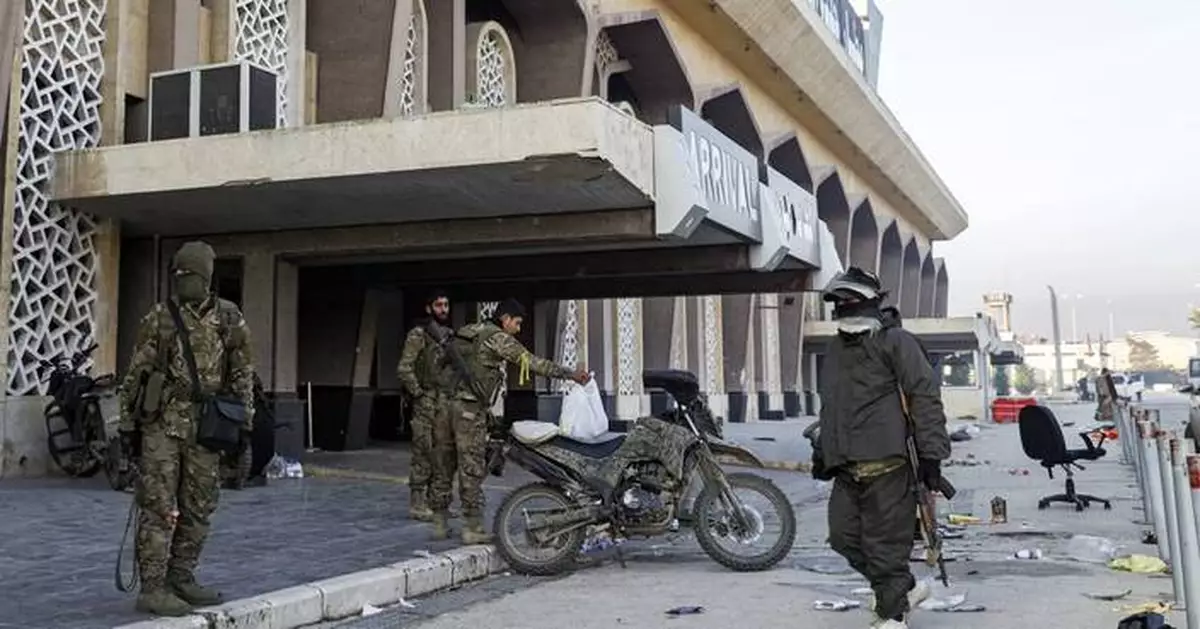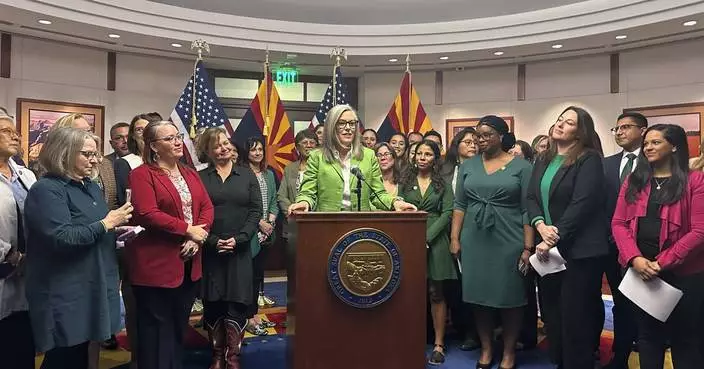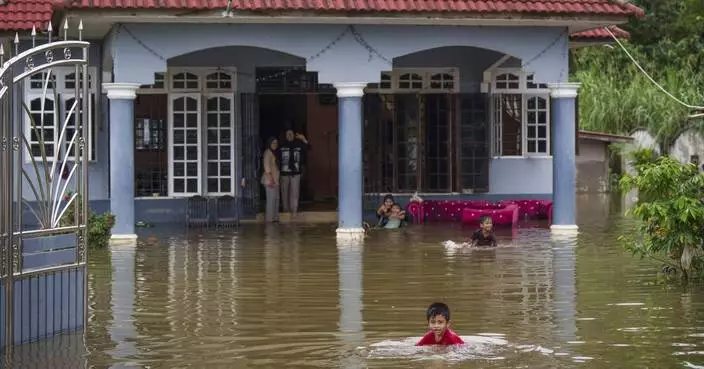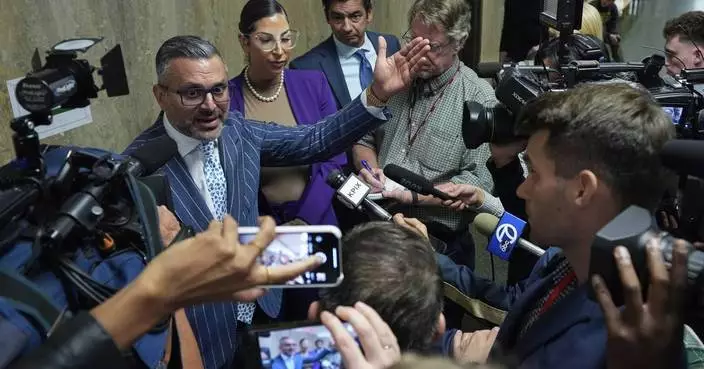BEIRUT (AP) — Syrian insurgents captured four new towns early Tuesday, bringing them closer to the central city of Hama, opposition activists said, while government forces retook some territory they lost last week.
The capture of the towns is the latest in the push by insurgents led by the salafi jihadi Hayat Tahrir al-Sham, as well as Turkey-backed opposition fighters. Insurgents now are about 10 kilometers (6 miles) from Hama, the country’s fourth largest city.
The latest push is part of a wide offensive by forces opposed to Syrian President Bashar Assad that over the past days has captured large parts of the northern city of Aleppo, Syria’s largest, as well as towns and villages in southern parts of the northwestern Idlib province.
The insurgents’ military operations administration said gunmen killed 50 government forces as they captured the central towns of Halfaya, Taybat al-Imam, Maardis and Soran. The Britain-based Syrian Observatory for Human Rights, an opposition war monitor, confirmed that the towns were taken.
The pro-government Dama Post media outlet reported intense clashes in an around the towns, adding that Syrian troops are firing artillery shells at insurgents in the area. State media reported intense airstrikes by Syrian and Russian air forces in the area.
Both the Observatory and pro-government media outlets reported that Syrian government forces on Tuesday captured the village of Khanaser, days after losing it. Khanaser sits on one of the roads that lead to Aleppo.
The long war between Assad and his foreign backers and the array of armed opposition forces seeking his overthrow has killed an estimated half-million people over the past 13 years.
To the east, the Kurdish-led Syrian Democratic Forces said in a statement that they captured seven villages from pro-government fighters. Syrian state media, however, denied that the villages were captured by the U.S.-backed SDF saying that the attack was repelled.
The villages are close to a base housing U.S. troops in the area that is close to Iraq.
Also Tuesday, Hakan Fidan, the foreign minister of Turkey, which is a main backer of groups opposed to Assad, said the recent rapid advance by insurgents in Syria shows that the Syrian president must reconcile with his own people and hold talks with the opposition.
Assad and officials in his government say all armed groups in opposition-held parts of Syria are terrorists and has rejected any political solution with them.
Turkey has been seeking to normalize ties with Syria to address security threats from groups affiliated with Kurdish militants along its southern border and to help ensure the safe return of more than 3 million Syrian refugees. Assad has insisted that Turkey's withdrawal of its military forces from northern Syria be a condition for any normalization between the two countries.
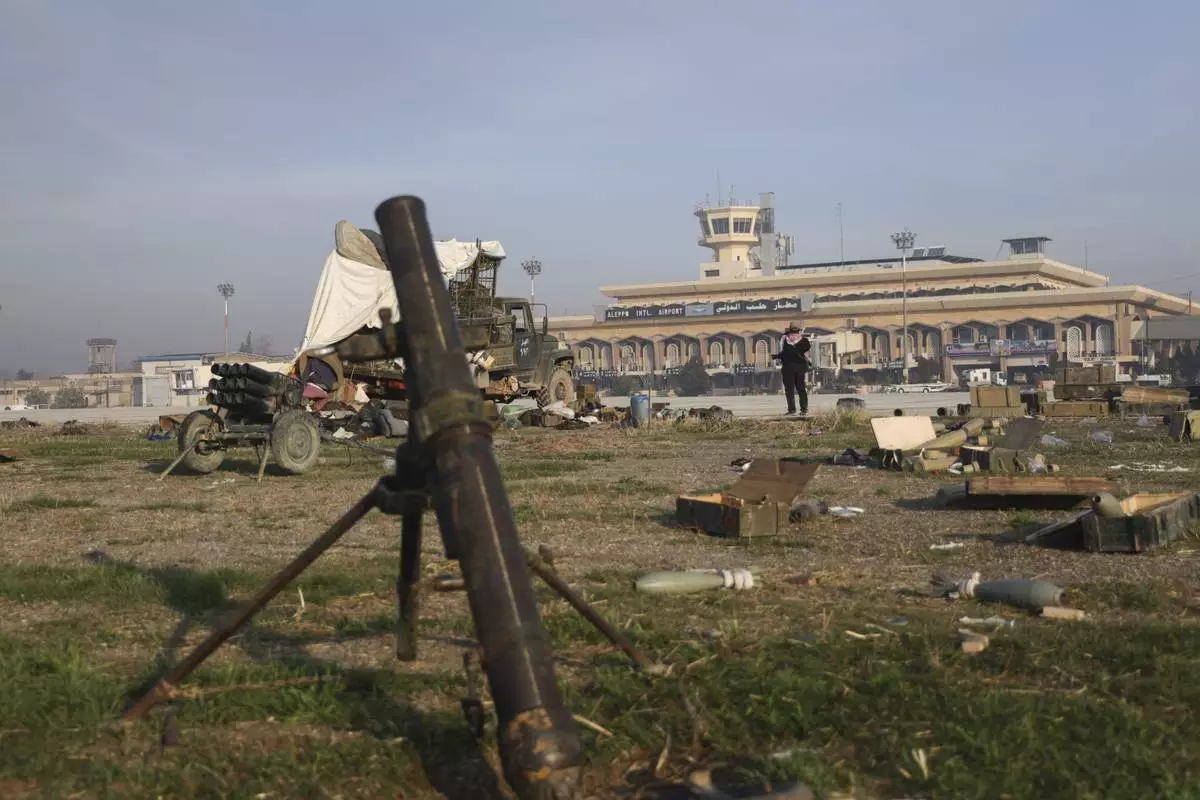
Military equipment is scattered outside the airport as opposition fighters control the facility in Aleppo Monday, Dec. 2, 2024. .(AP Photo/Omar Albam)
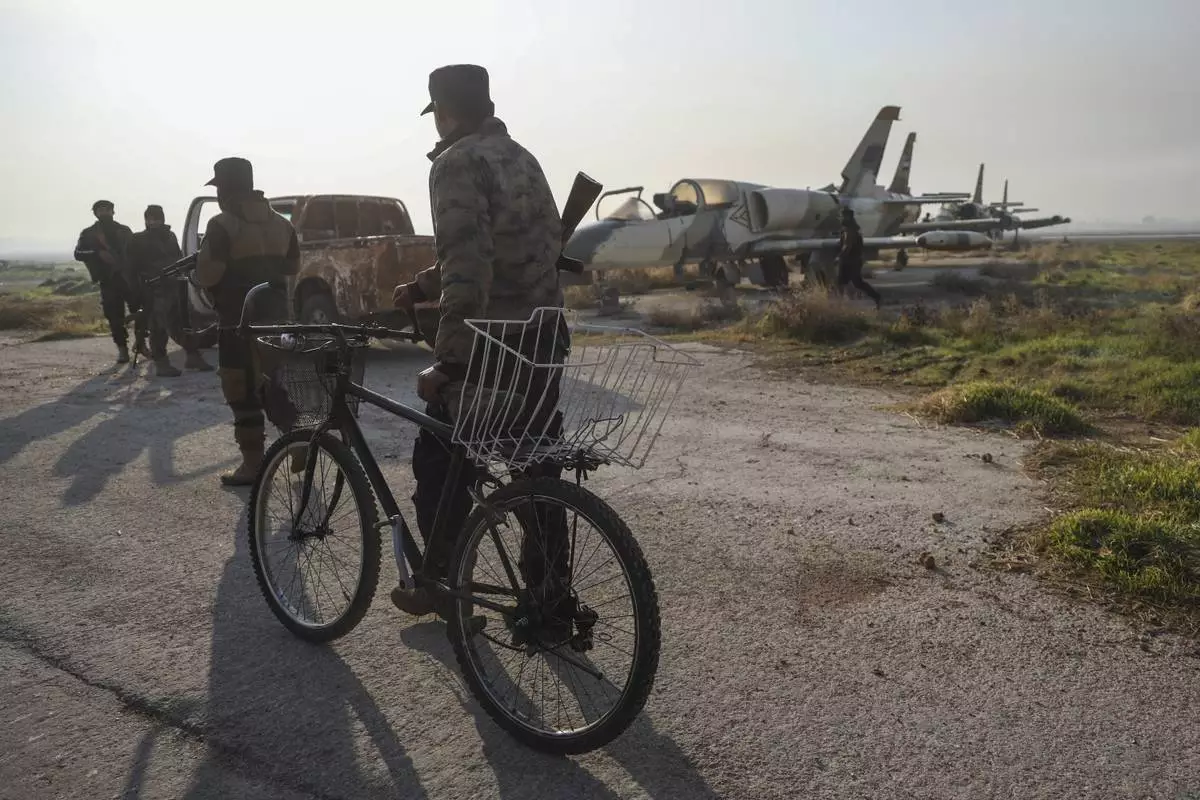
Syrian opposition fighters stand next to old military planes at the Al-Nayrab military airport after they took control of the facility in the outskirts of Aleppo, Syria, Monday, Dec. 2, 2024. .(AP Photo/Omar Albam)
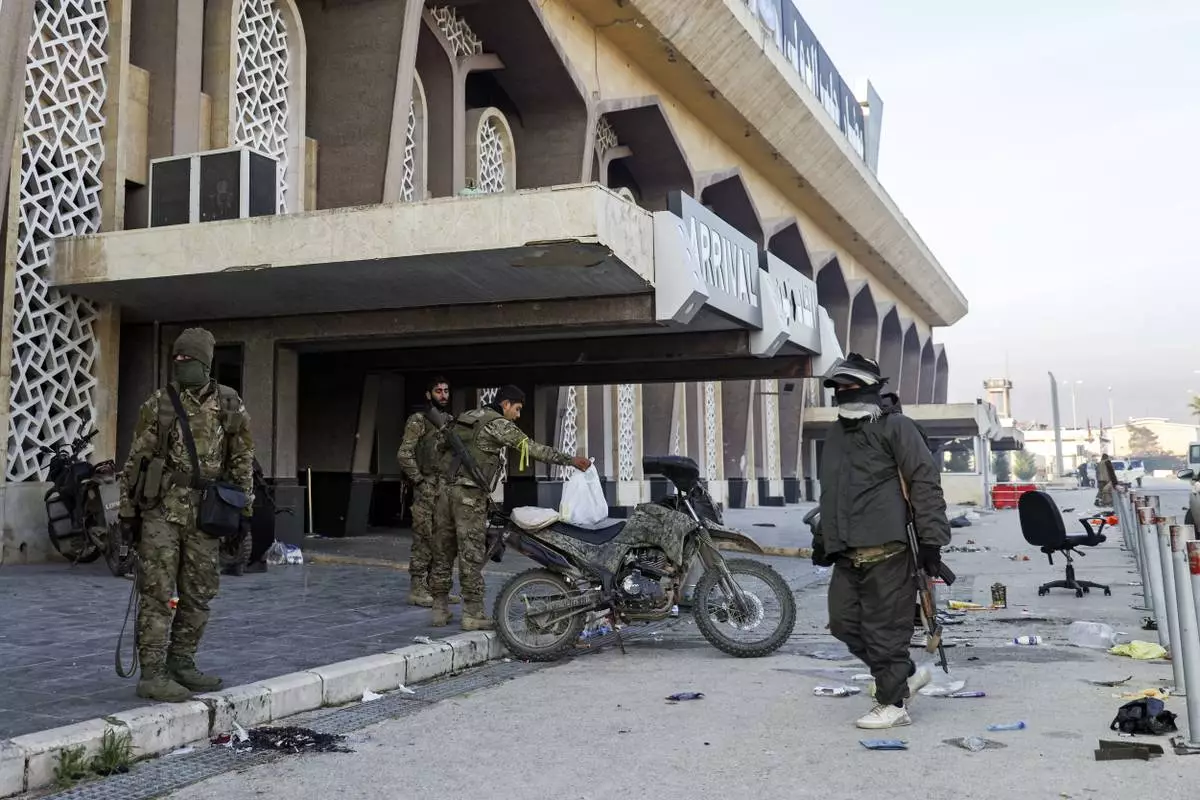
Syrian opposition fighters hang out at the arrivals gate of the Aleppo international airpot in Aleppo, Syria, Monday, Dec. 2, 2024. .(AP Photo/Omar Albam)
SEOUL, South Korea (AP) — South Korea’s main opposition party on Wednesday urged President Yoon Suk Yeol to resign immediately or face impeachment, hours after Yoon ended short-lived martial law that prompted troops to encircle parliament before lawmakers voted to lift it.
Yoon didn't make any immediate public response to the opposition's demand. But his office said senior presidential advisers and secretaries for Yoon offered to resign collectively and the president also put off his official Wednesday morning schedule.
On Tuesday night, Yoon abruptly imposed the emergency martial law, vowing to eliminate “anti-state” forces after he struggled to push forward his agenda in the opposition-dominated parliament. But his martial law was effective for only about six hours, as the National Assembly voted to overrule the president. The declaration was formally lifted around 4:30 a.m. during a Cabinet meeting.
The liberal opposition Democratic Party, which holds a majority in the 300-seat parliament, said Wednesday that its lawmakers decided to call on Yoon to quit immediately or they would take steps to impeach him.
“President Yoon Suk Yeol’s martial law declaration was a clear violation of the constitution. It didn’t abide by any requirements to declare it," the Democratic Party said in a statement. “His martial law declaration was originally invalid and a grave violation of the constitution. It was a grave act of rebellion and provides perfect grounds for his impeachment.”
Impeaching him would require support from two-thirds of the parliament, or 200 of its 300 members. The Democratic Party and other small opposition parties together have 192 seats. But when the parliament rejected Yoon’s martial law declaration in a 190-0 vote, about 10 lawmakers from Yoon’s ruling People Power Party cast ballots supporting the rejection, according to National Assembly officials.
If Yoon is impeached, he’ll be stripped of his constitutional powers until the Constitutional Court can rule on his fate. Prime Minister Han Duck-soo, the No. 2 position in the South Korean government, would take over his presidential responsibilities.
Yoon’s martial law declaration, the first of its kind in more than 40 years, harkened to South Korea’s past military-backed governments when authorities occasionally proclaimed martial law and other decrees that allowed them to station combat soldiers, tanks and armored vehicles on streets or at public places like schools to prevent anti-government demonstrations. Such scenes of military intervention had not been seen since South Korea achieved a genuine democracy in the late 1980s until Tuesday night.
After Yoon’s declaration, troops carrying rifles and police officers were quickly deployed at parliament to ban the entrance of people, as protesters crowded outside the parliamentary compound. An Associated Press photographer saw at least three helicopters, likely from the military, that landed inside the Assembly grounds, while two or three helicopters circled above the site.
No major violence has been reported. The troops and police personnel were later seen leaving the ground of the National Assembly after the parliamentary vote to lift the martial law. National Assembly Speaker Woo Won Shik said: “Even with our unfortunate memories of military coups, our citizens have surely observed the events of today and saw the maturity of our military.”
Ruling People Power Party Han Dong-hun demanded that Yoon explain his decision and fire Defense Minister Kim Yong Hyun, who he said recommended the martial law decree to Yoon. The Defense Ministry has not commented.
Under South Korea’s constitution, the president can declare martial law during “wartime, war-like situations or other comparable national emergency states” that require the use of military force to restrict the freedom of press, assembly and other rights to maintain order. Many observers question whether South Korea is currently in such a state.
The constitution also states that the president must oblige when the National Assembly demands the lifting of martial law with a majority vote.
In Washington, the White House said the U.S. was “seriously concerned” by the events in Seoul. A spokesperson for the National Security Council said President Joe Biden’s administration was not notified in advance of the martial law announcement and was in contact with the South Korean government.
Pentagon spokesman Maj. Gen. Pat Ryder said there was no effect on the more than 27,000 U.S. service members based in South Korea.
Yoon's government and ruling party have been embroiled in an impasse with the Democratic Party over next year’s budget bill and a Democratic Party-led attempt to to impeach three top prosecutors.
During his televised announcement, Yoon also described the opposition as “shameless pro-North Korean anti-state forces who are plundering the freedom and happiness of our citizens.” He did not elaborate. North Korea has no immediate comments.
Natalia Slavney, research analyst at the Stimson Center’s 38 North website that focuses on Korean affairs, said Yoon’s imposition of martial law was “a serious backslide of democracy” that followed a “worrying trend of abuse” since he took office in 2022.
South Korea “has a robust history of political pluralism and is no stranger to mass protests and swift impeachments,” Slavney said, citing the example of former President Park Geun-hye, who was ousted from office and imprisoned for bribery and other crimes in 2017. She was later pardoned.
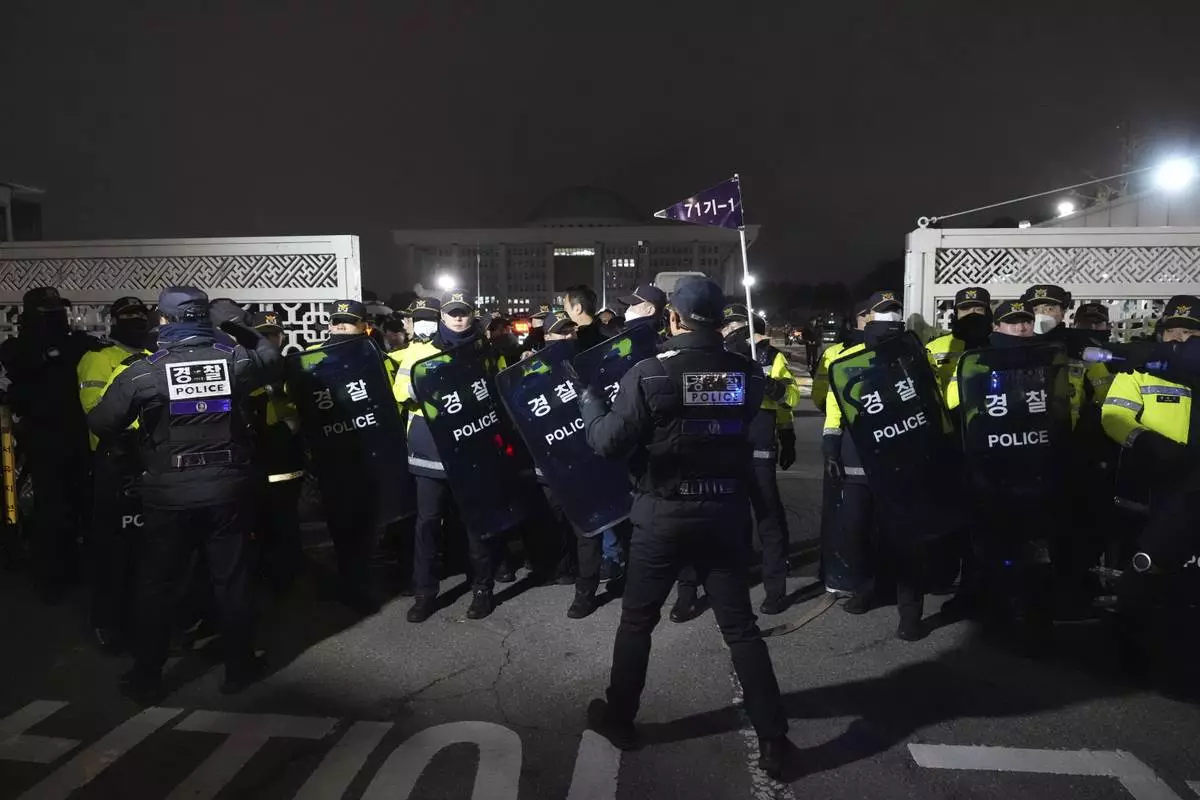
Police officers stand guard in front of the National Assembly in Seoul, South Korea, Tuesday, Dec. 3, 2024. (AP Photo/Lee Jin-man)
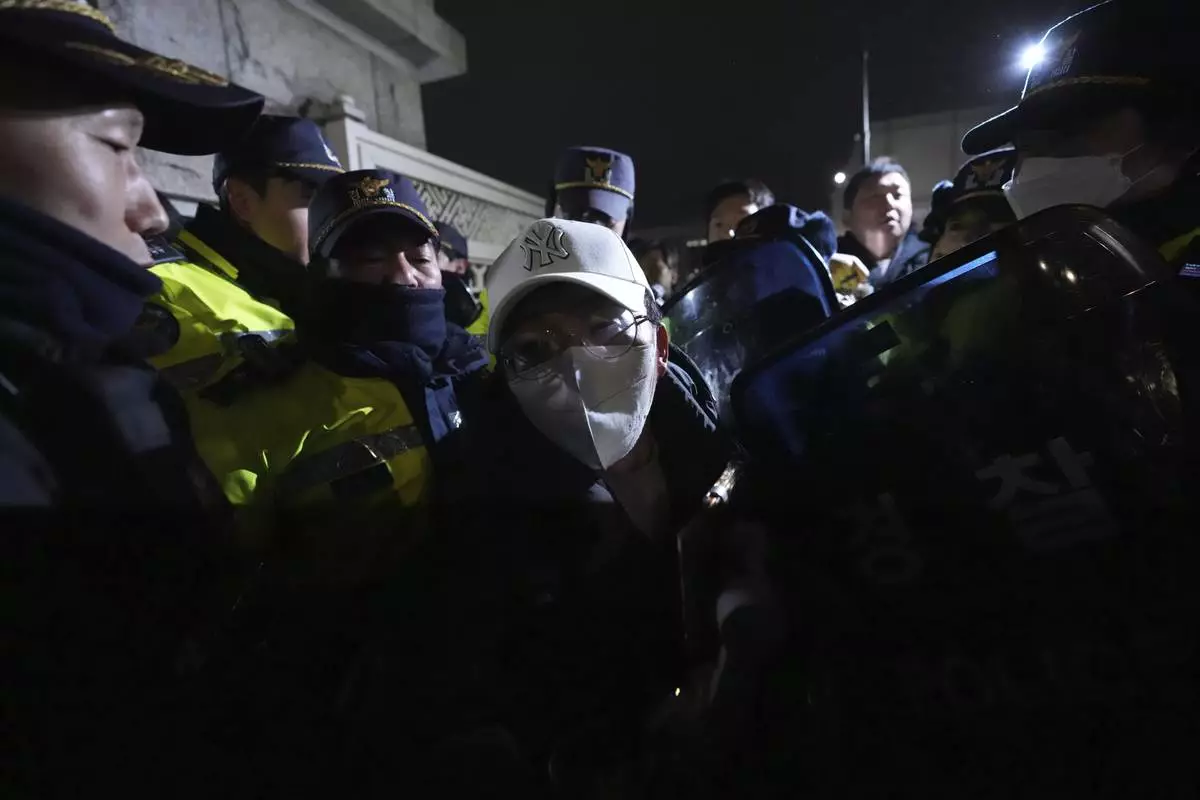
People try to enter as police officers stand guard in front of the National Assembly in Seoul, South Korea, Tuesday, Dec. 3, 2024. (AP Photo/Lee Jin-man)
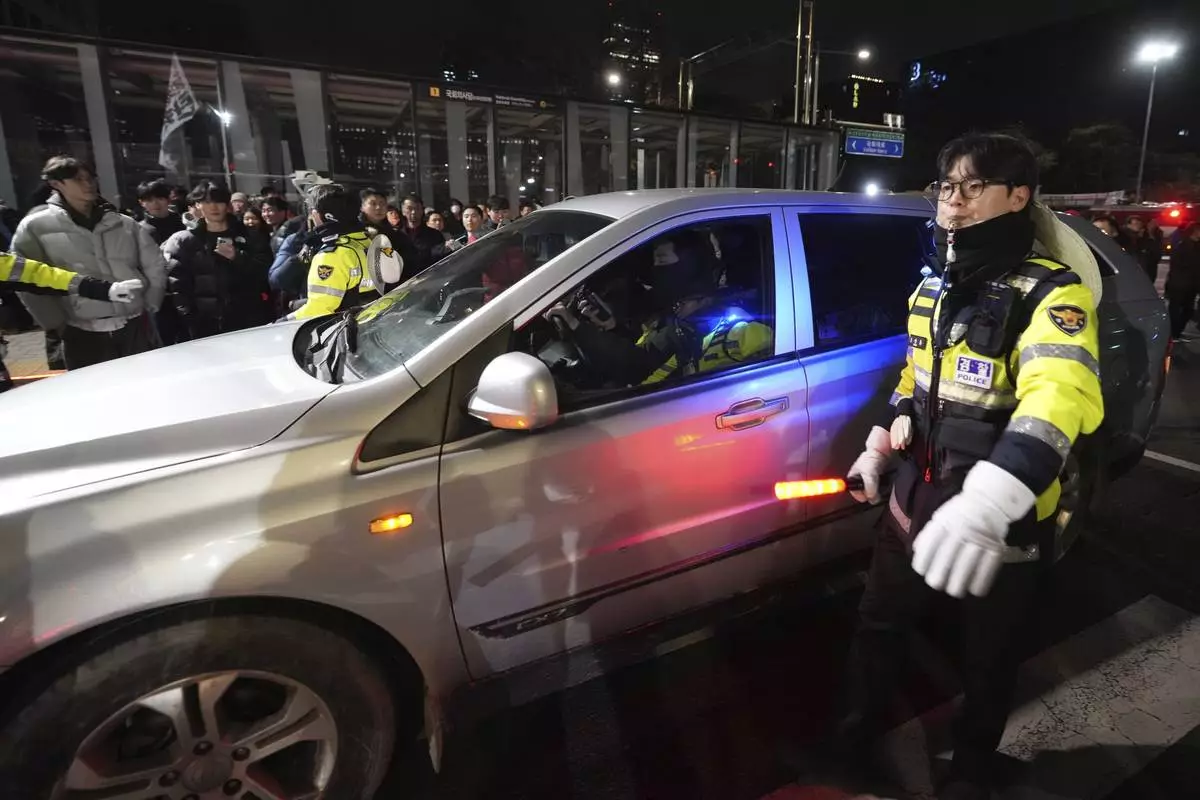
Military vehicles is escorted by police officers outside of the National Assembly in Seoul, South Korea, Wednesday, Dec. 4, 2024. (AP Photo/Lee Jin-man)
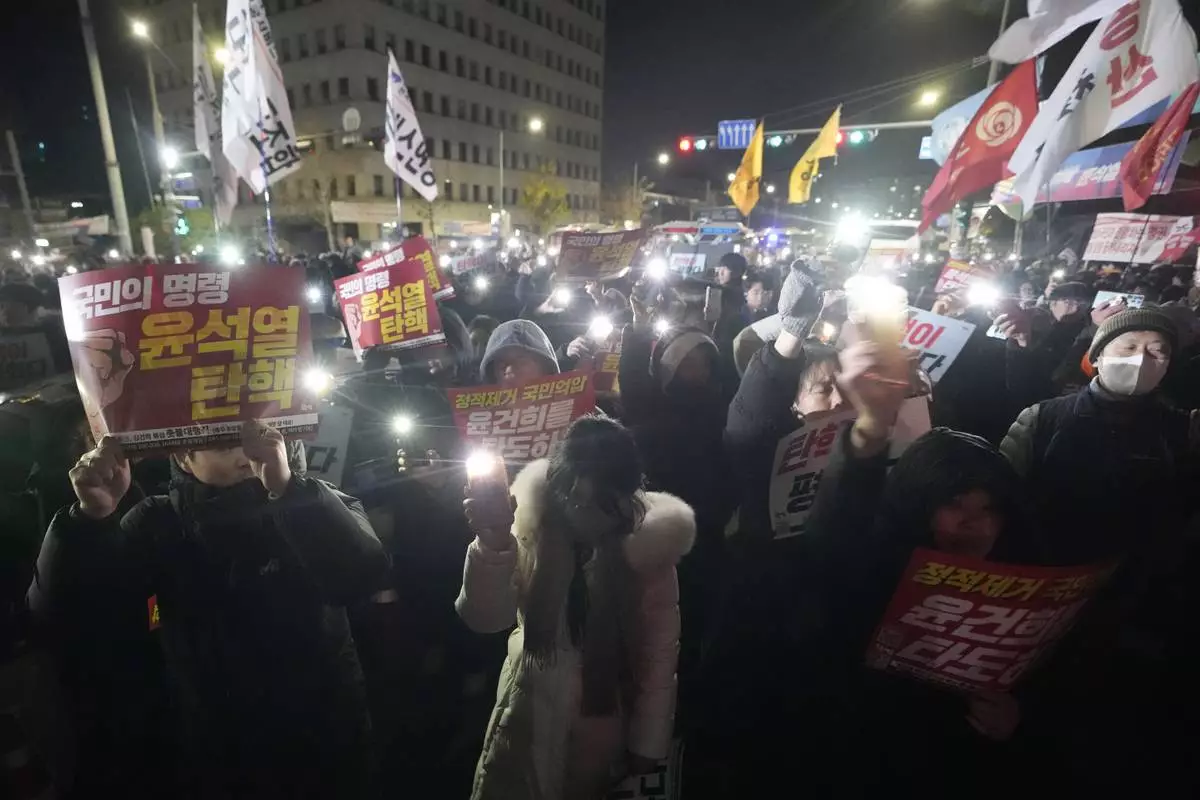
People gather to demand South Korean President Yoon Suk Yeol to step down in front of the National Assembly in Seoul, South Korea, Wednesday, Dec. 4, 2024. (AP Photo/Ahn Young-joon)
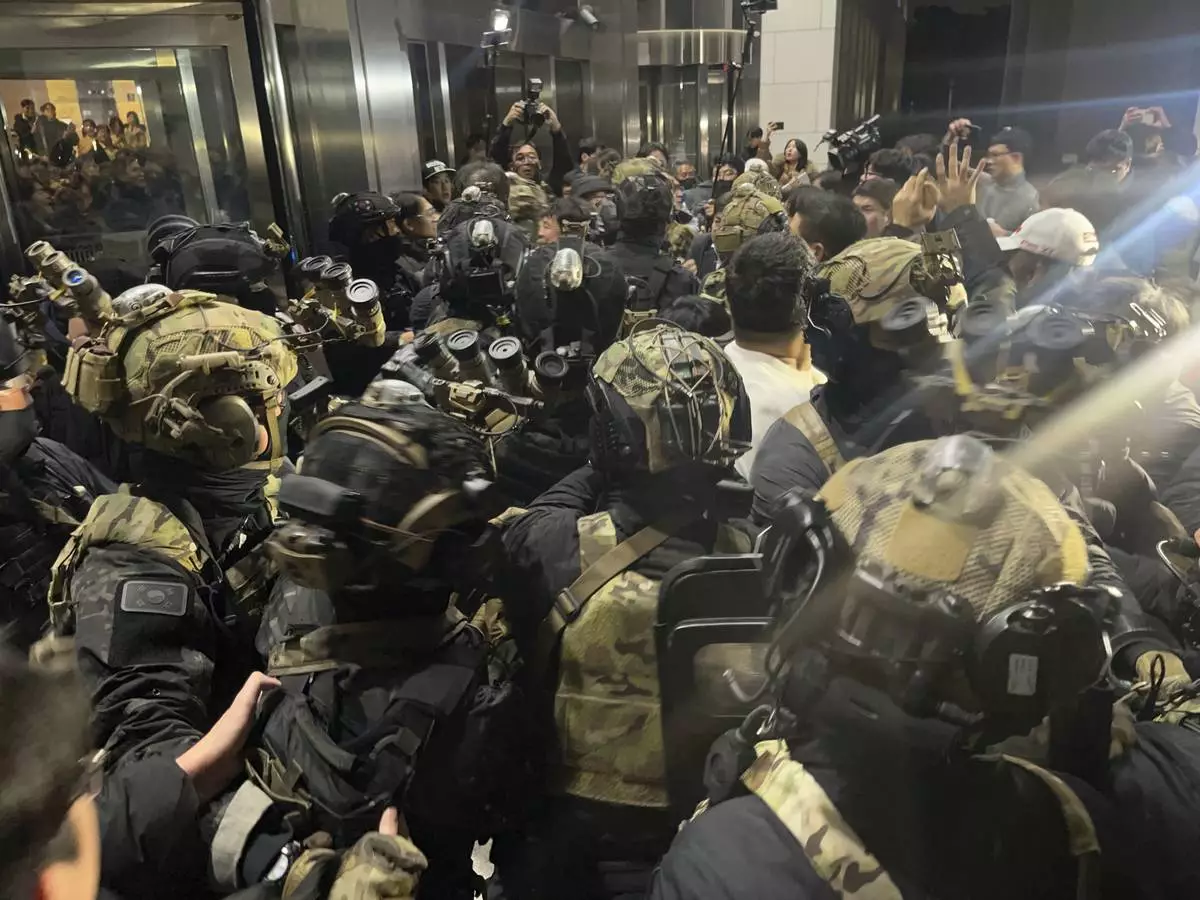
South Korean martial law soldiers try to enter the National Assembly compound in Seoul, South Korea, Wednesday, Dec. 4, 2024. (Cho Jung-woo/Newsis via AP)
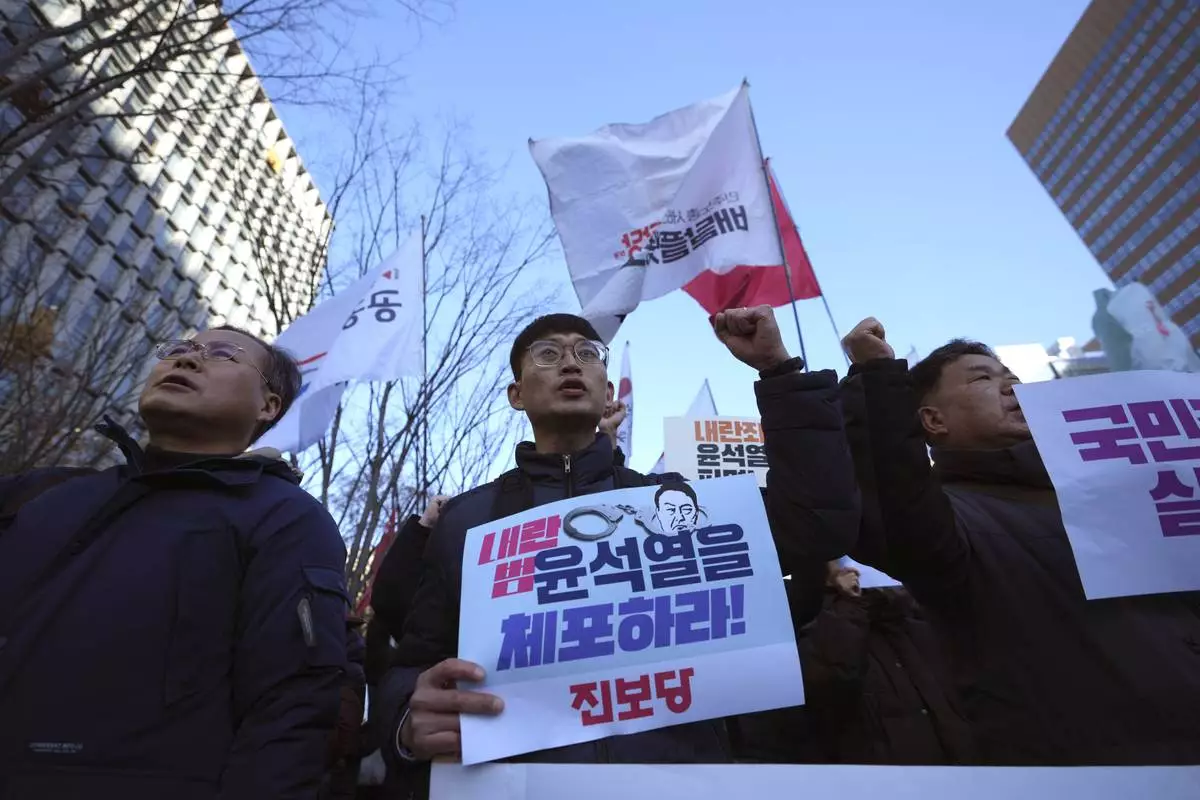
South Koreans shout slogans with signs reading "Arrest Yoon Suk Yeol" during a rally in Seoul, South Korea, Wednesday, Dec. 4, 2024. (AP Photo/Lee Jin-man)
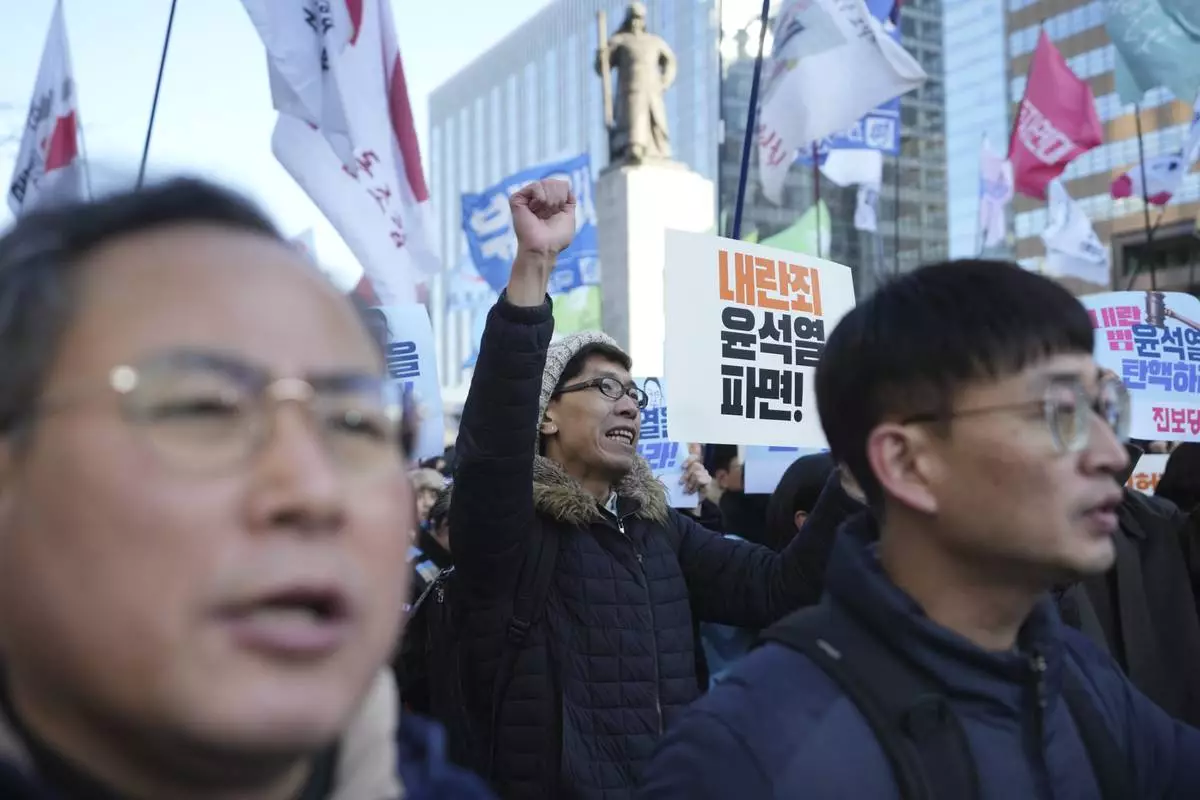
South Koreans shout slogans during a rally in Seoul, South Korea, Wednesday, Dec. 4, 2024. (AP Photo/Lee Jin-man)
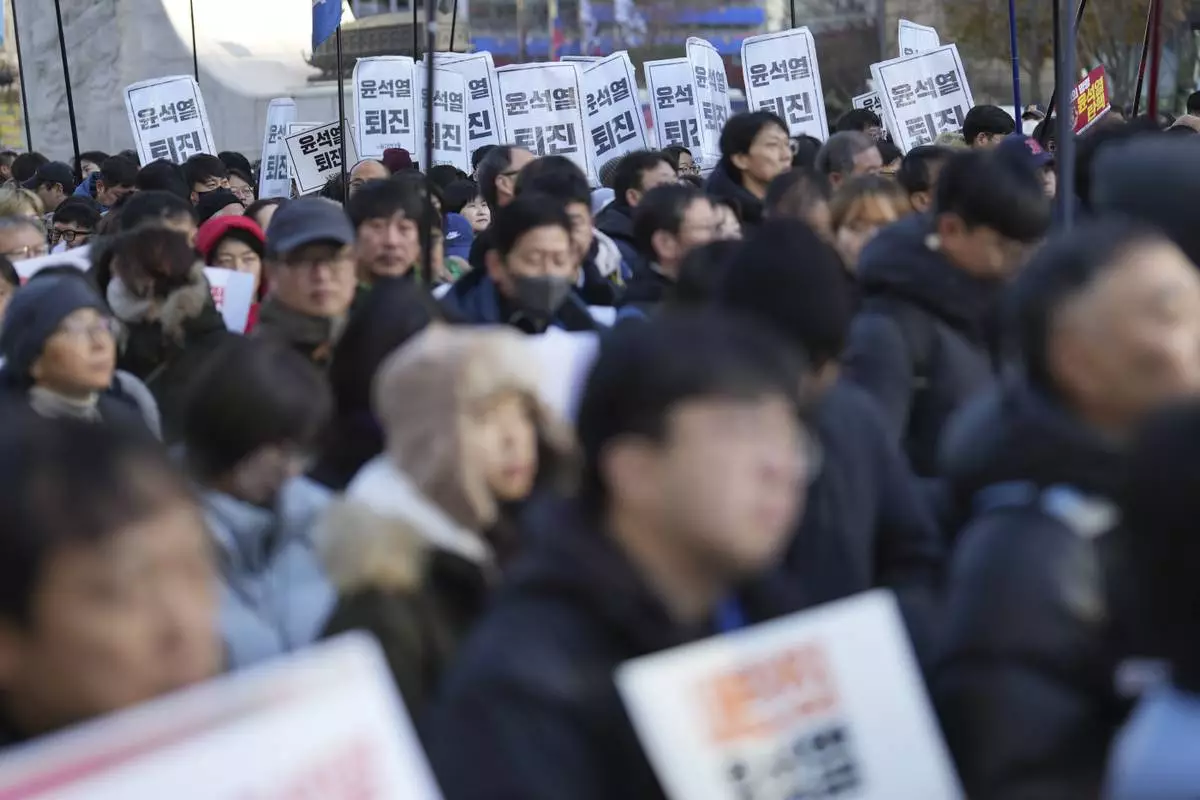
South Koreans hold signs reading "Resign Yoon Suk Yeol" during a rally in Seoul, South Korea, Wednesday, Dec. 4, 2024. (AP Photo/Lee Jin-man)
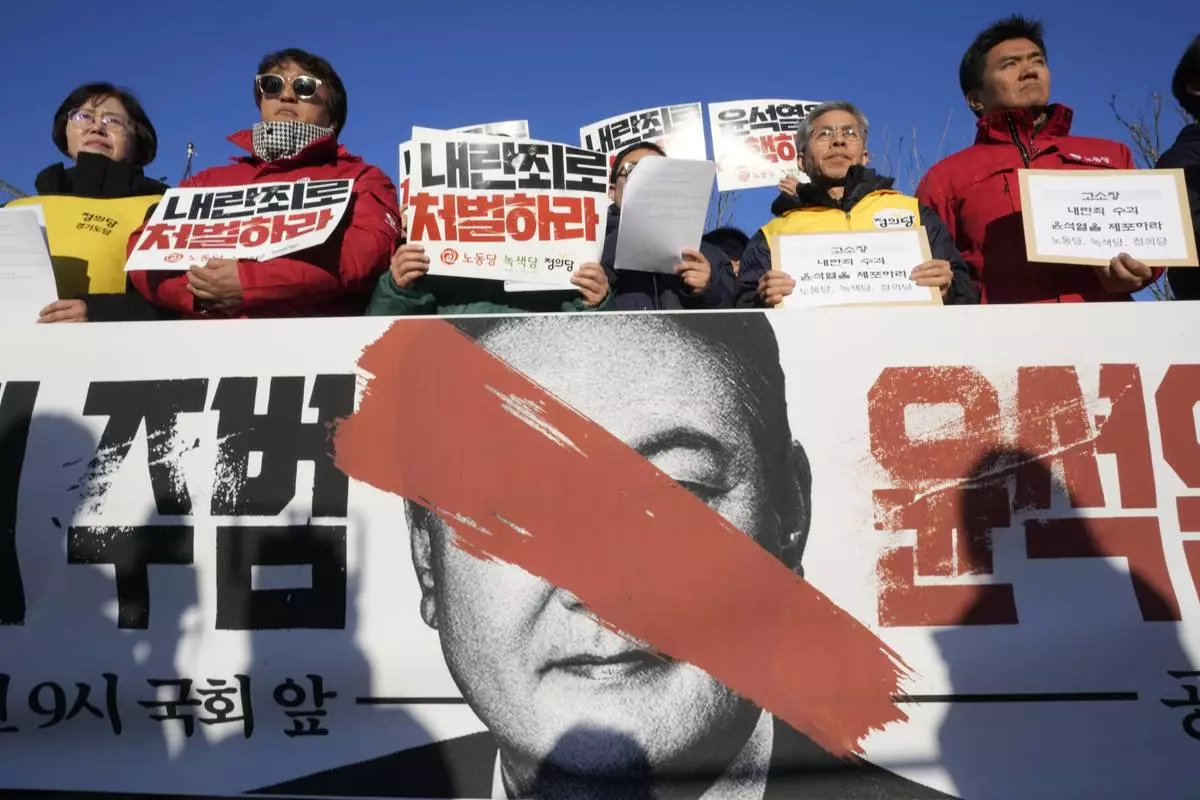
Protesters stage a rally to demand South Korean President Yoon Suk Yeol to step down in front of the National Assembly in Seoul, South Korea, Wednesday, Dec. 4, 2024. The signs read "Punish." (AP Photo/Ahn Young-joon)
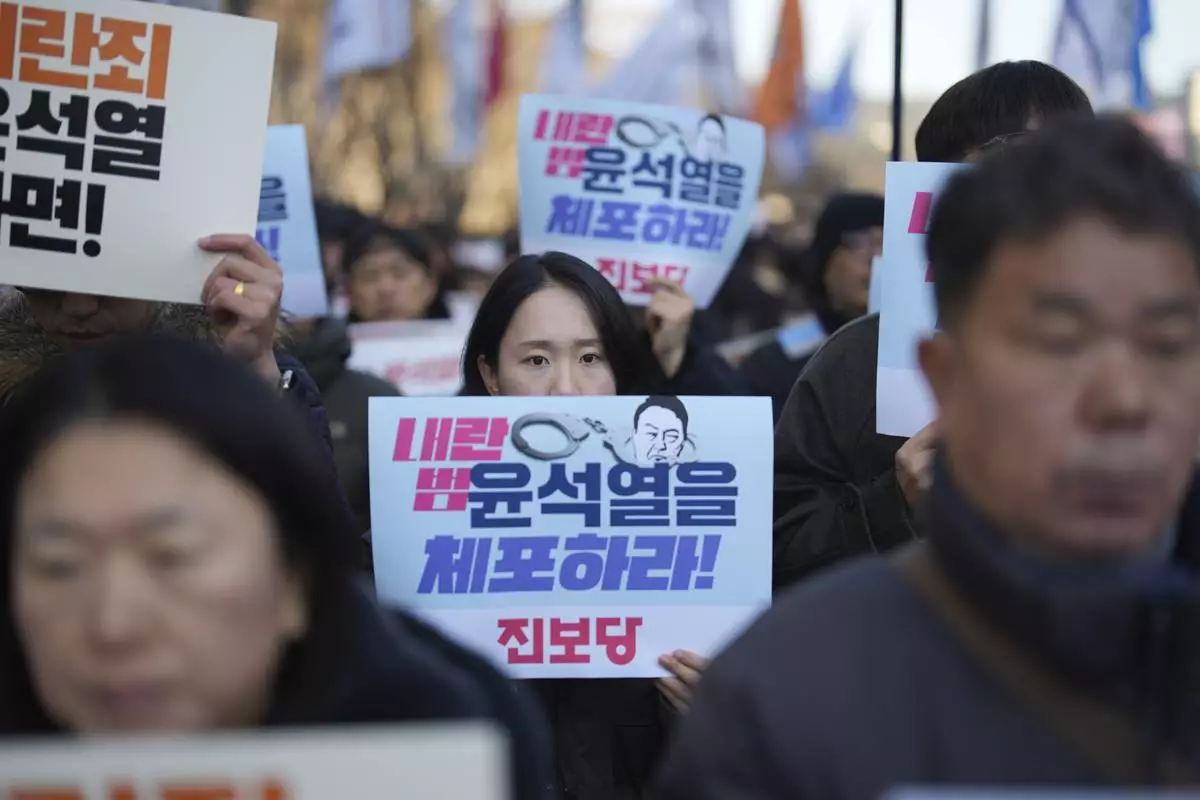
South Koreans hold signs reading "Arrest Yoon Suk Yeol" during a rally in Seoul, South Korea, Wednesday, Dec. 4, 2024. (AP Photo/Lee Jin-man)
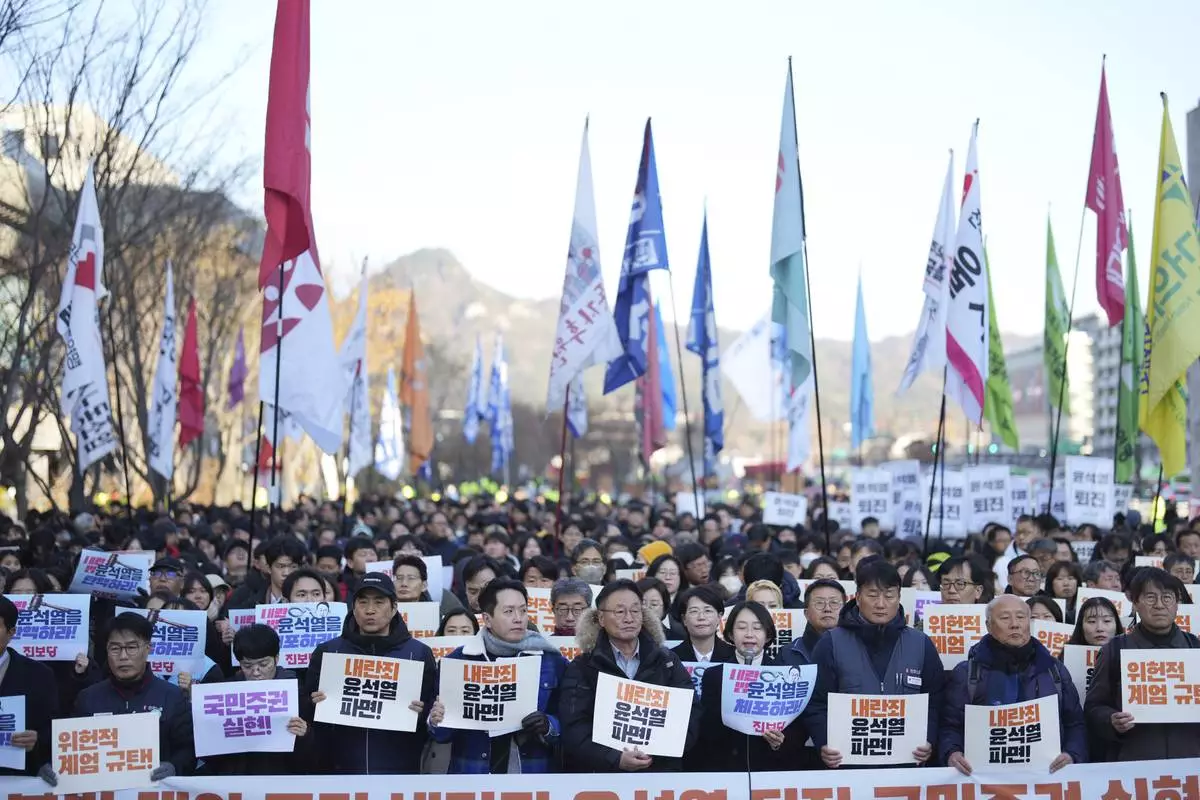
South Koreans hold signs reading "Expulsion of Yoon Suk Yeol" during a rally in Seoul, South Korea, Wednesday, Dec. 4, 2024. (AP Photo/Lee Jin-man)
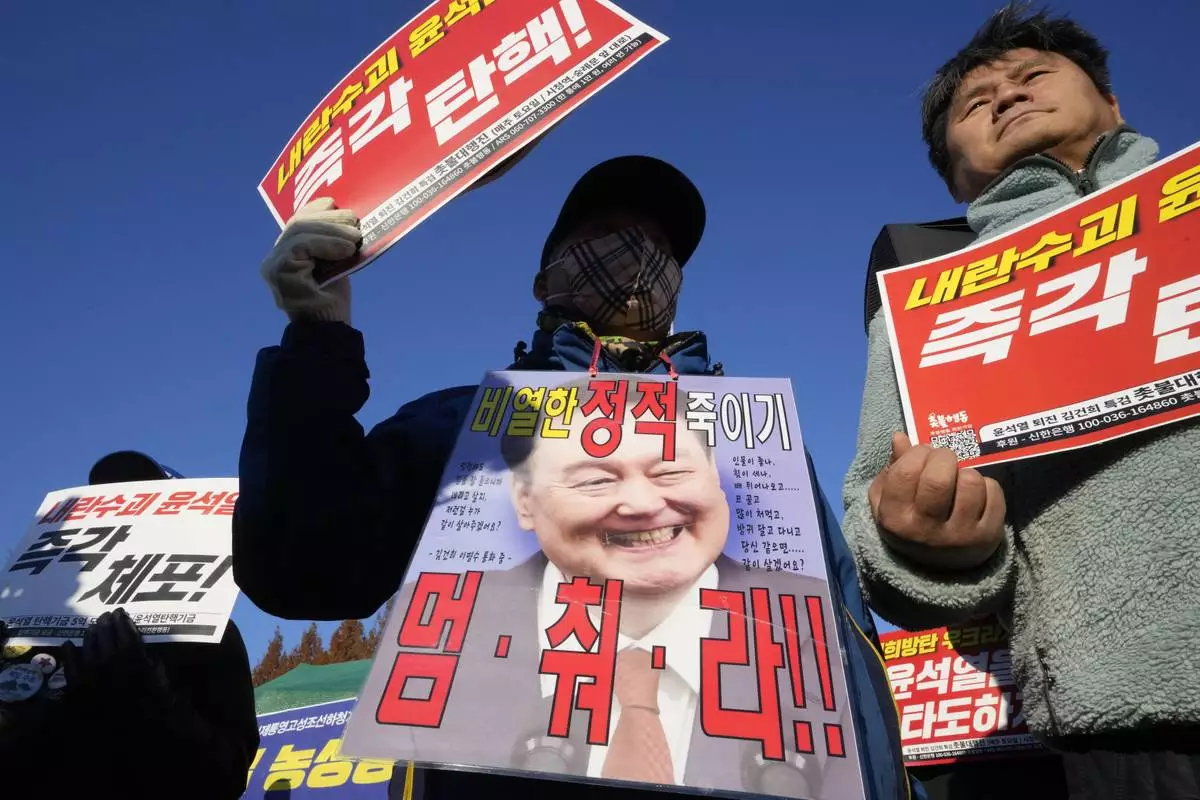
Protesters attend a rally to demand South Korean President Yoon Suk Yeol to step down in front of the National Assembly in Seoul, South Korea, Wednesday, Dec. 4, 2024. The signs read "Stop." (AP Photo/Ahn Young-joon)
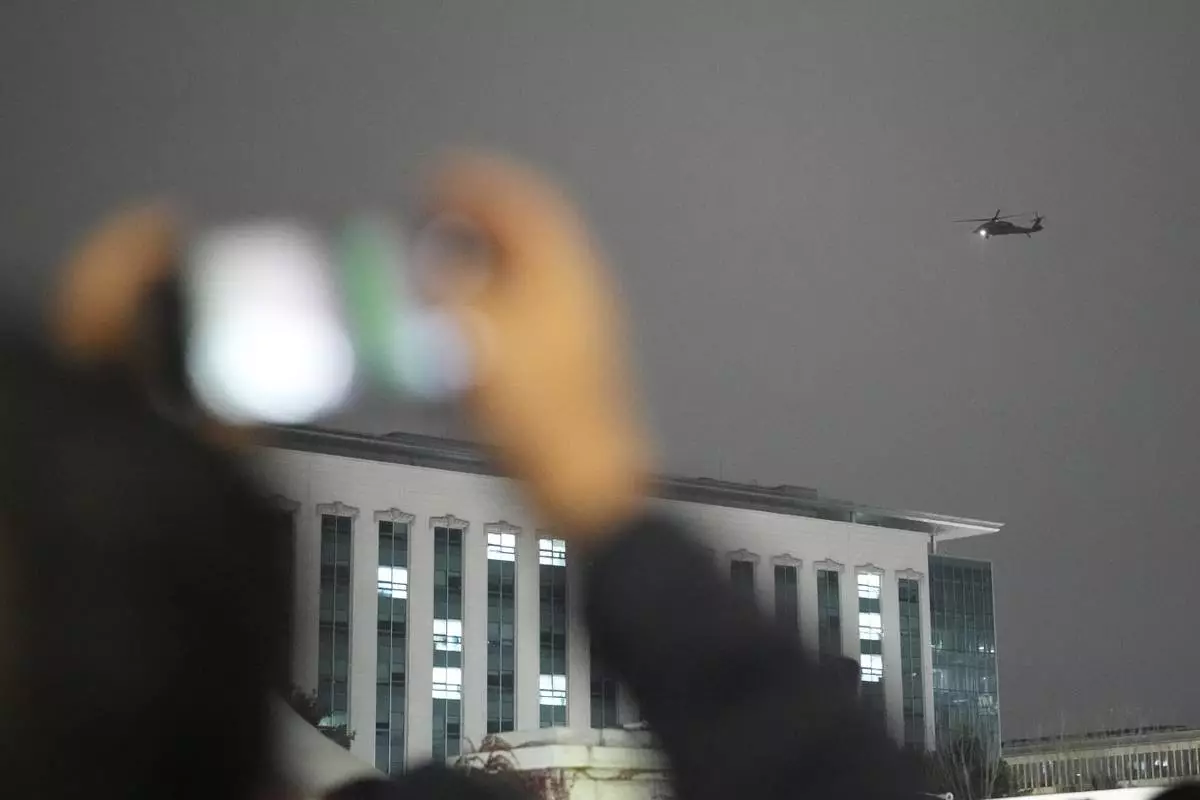
A helicopter flies over the National Assembly in Seoul, South Korea, Wednesday, Dec. 4, 2024. (AP Photo/Lee Jin-man)
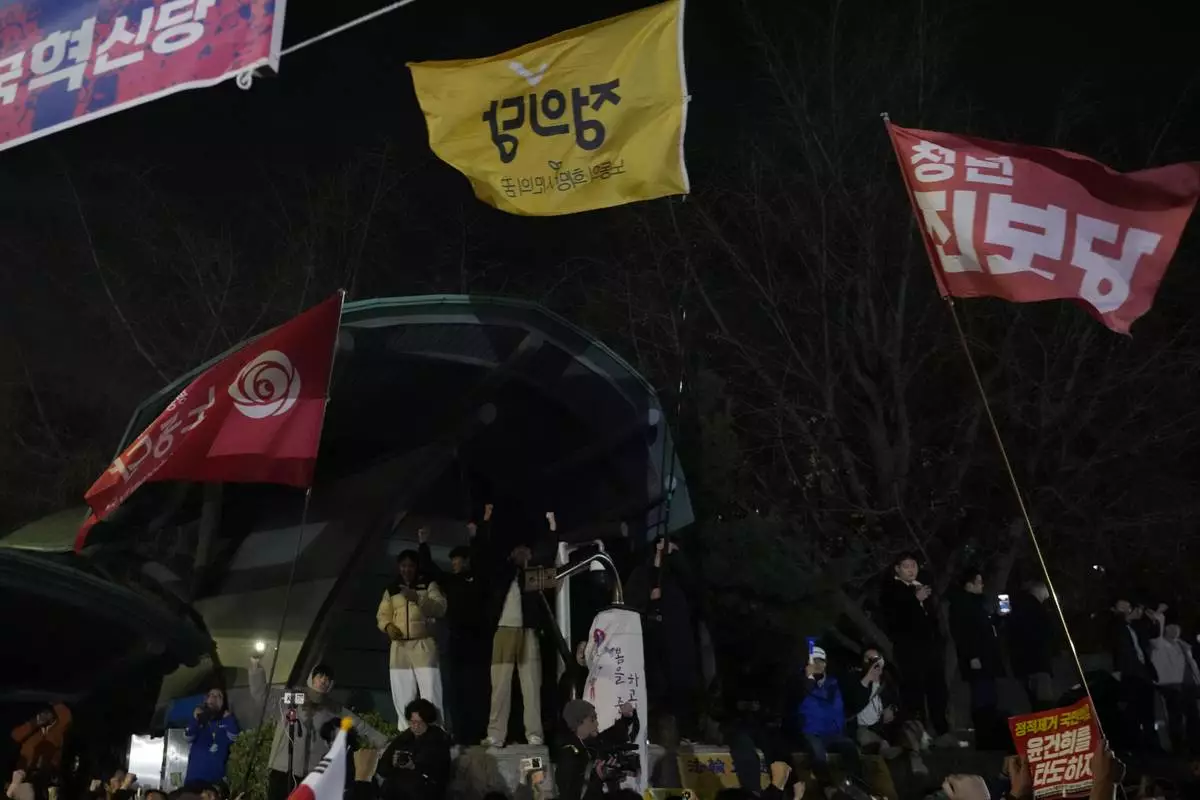
People gather in front of the National Assembly in Seoul, South Korea, Wednesday, Dec. 4, 2024. (AP Photo/Ahn Young-joon)
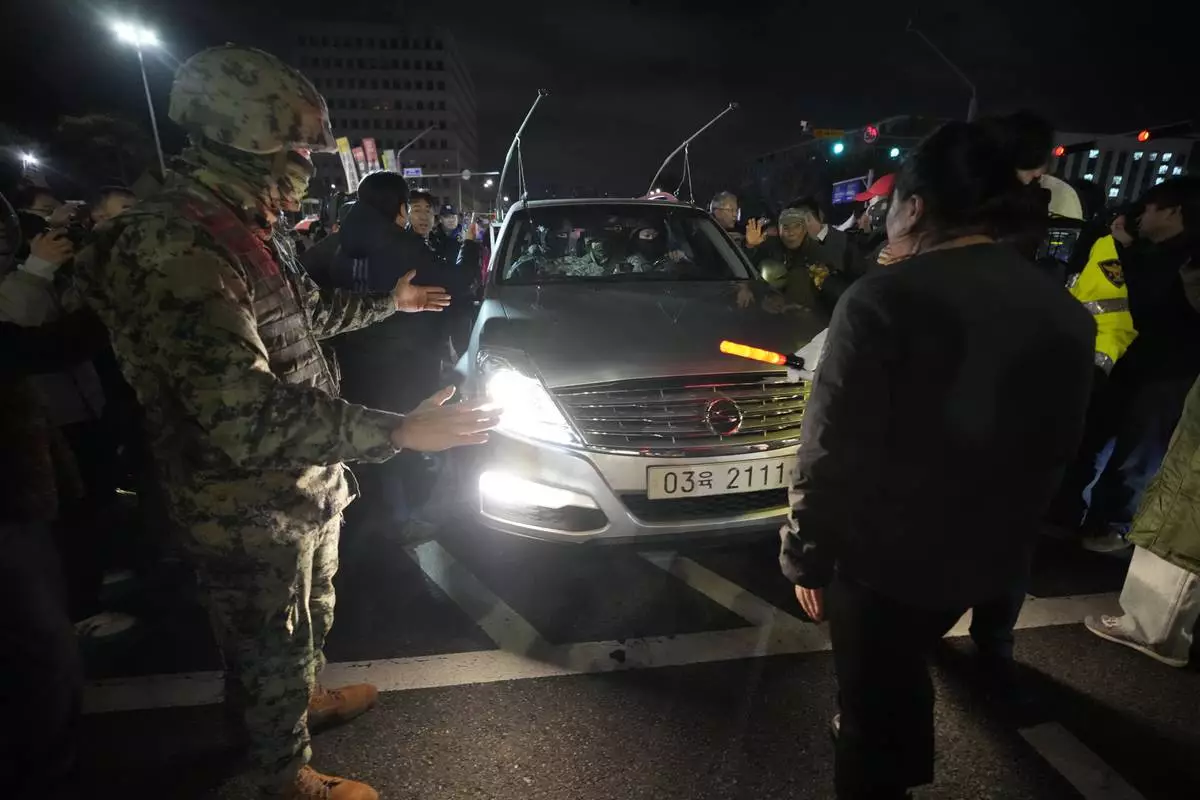
People bock a martial law vehicle as they gather to demand South Korean President Yoon Suk Yeol to step down in front of the National Assembly in Seoul, South Korea, Wednesday, Dec. 4, 2024. (AP Photo/Ahn Young-joon)
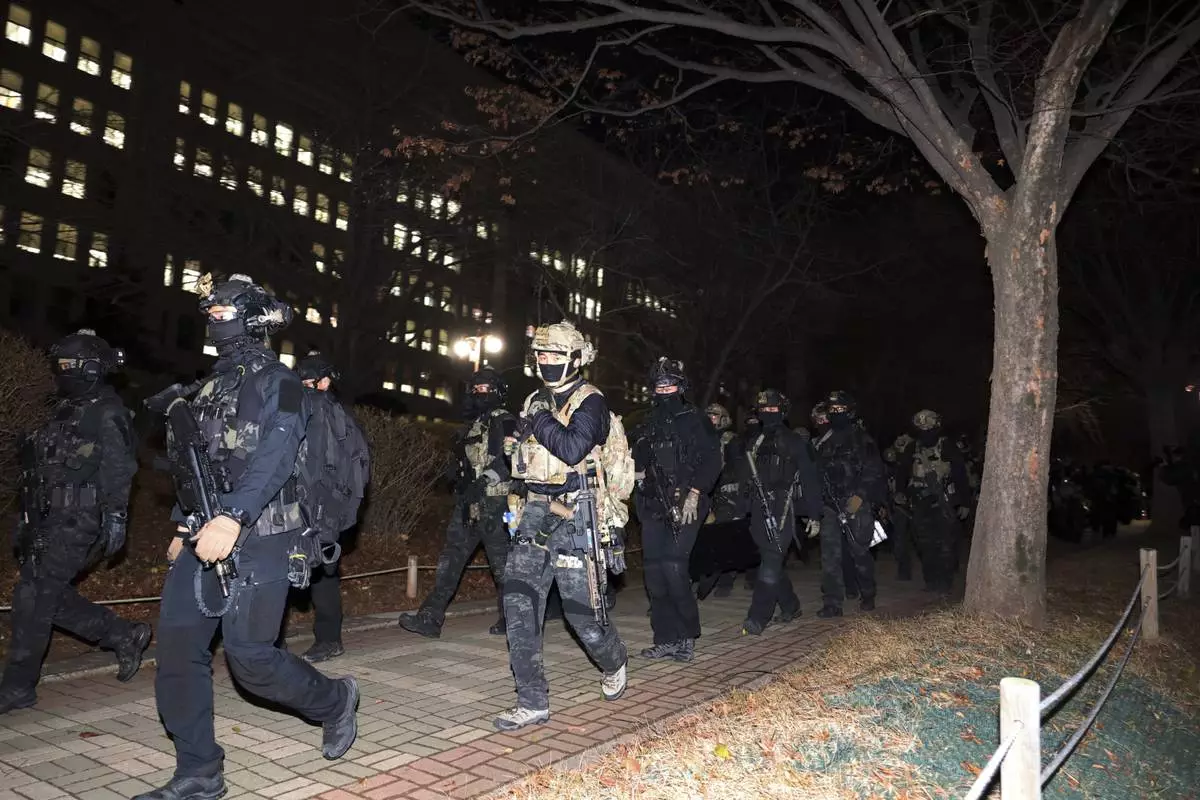
South Korean martial law soldiers leave the National Assembly in Seoul, South Korea, Wednesday, Dec. 4, 2024. (Kim Ju-sung/Yonhap via AP)
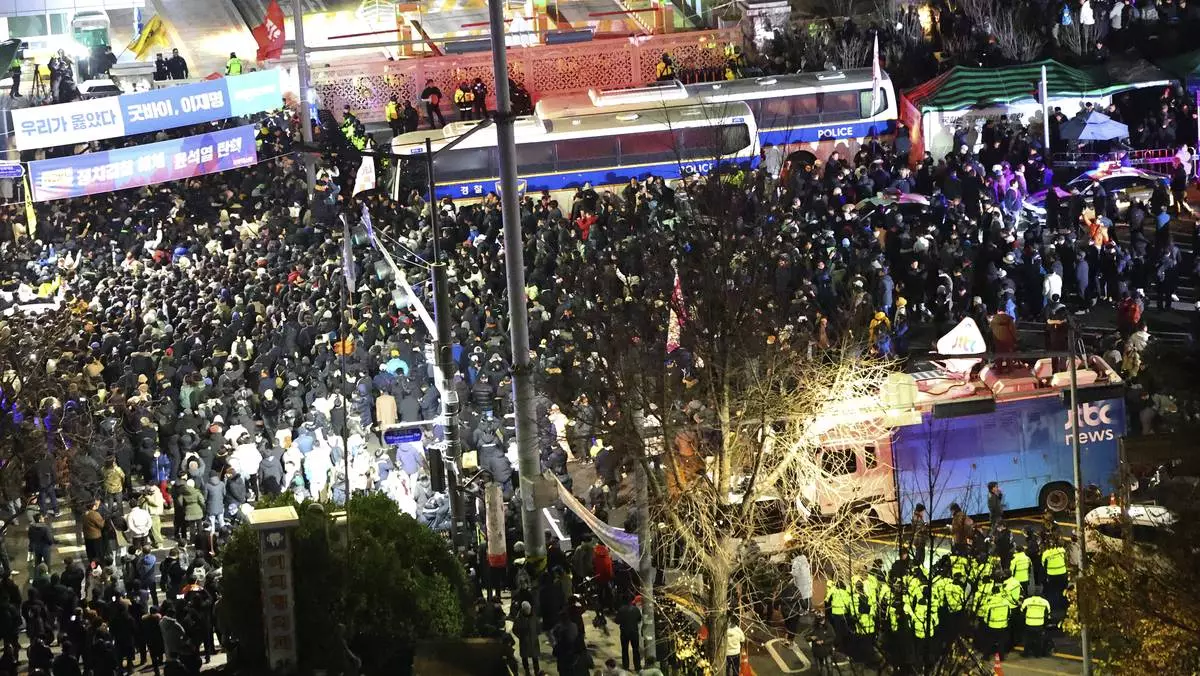
People gather to demand South Korean President Yoon Suk Yeol step down in front of the National Assembly in Seoul, South Korea, Wednesday, Dec. 4, 2024. (Kim Do-hoon/Yonhap via AP)
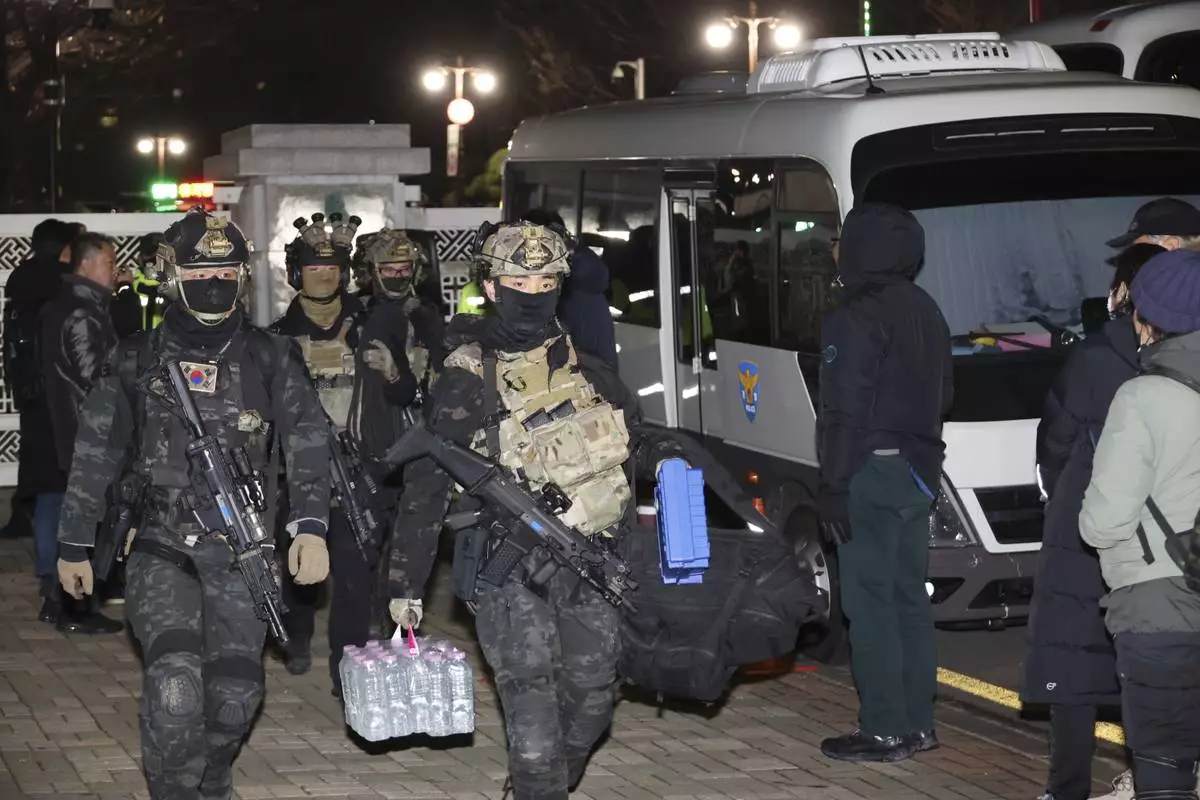
South Korean martial law soldiers leave the National Assembly in Seoul, South Korea, Wednesday, Dec. 4, 2024. (Kim Ju-sung/Yonhap via AP)
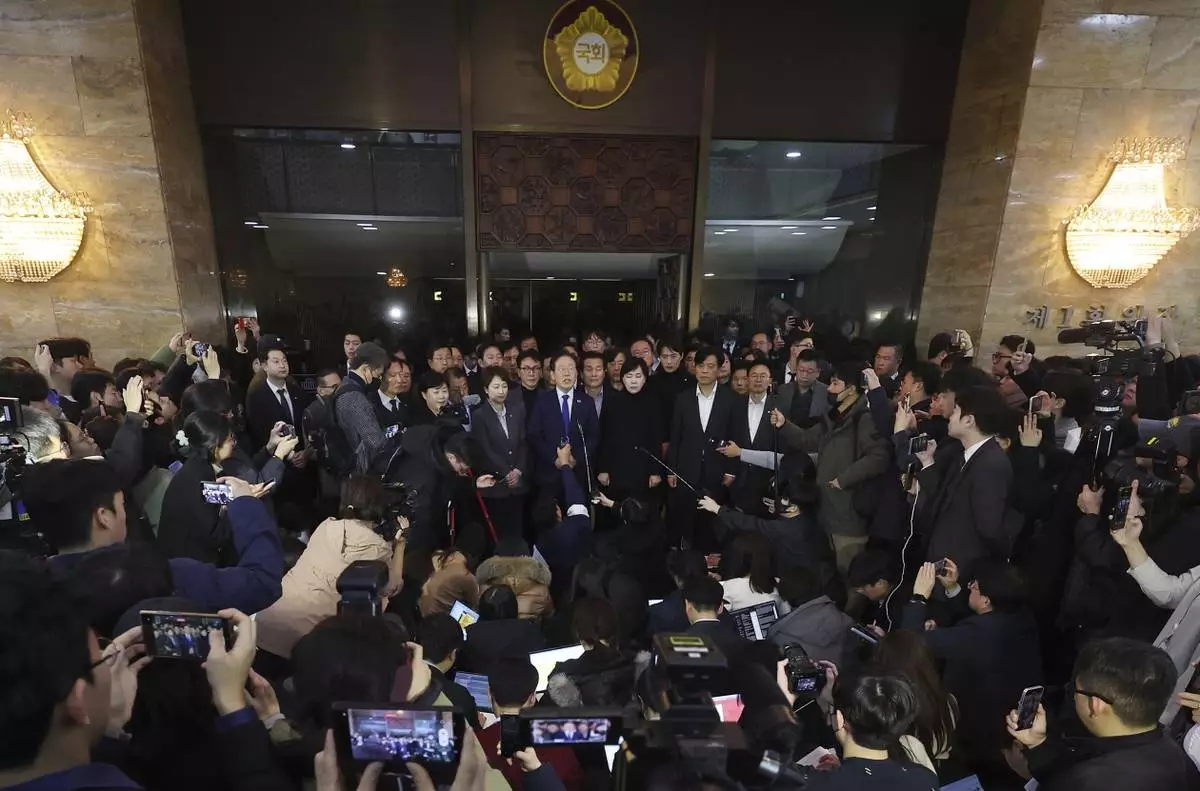
South Korea's main opposition Democratic Party leader Lee Jae-myung, top center, speaks at the National Assembly in Seoul, South Korea, Wednesday, Dec. 4, 2024. (Kim Ju-hyung/Yonhap via AP)
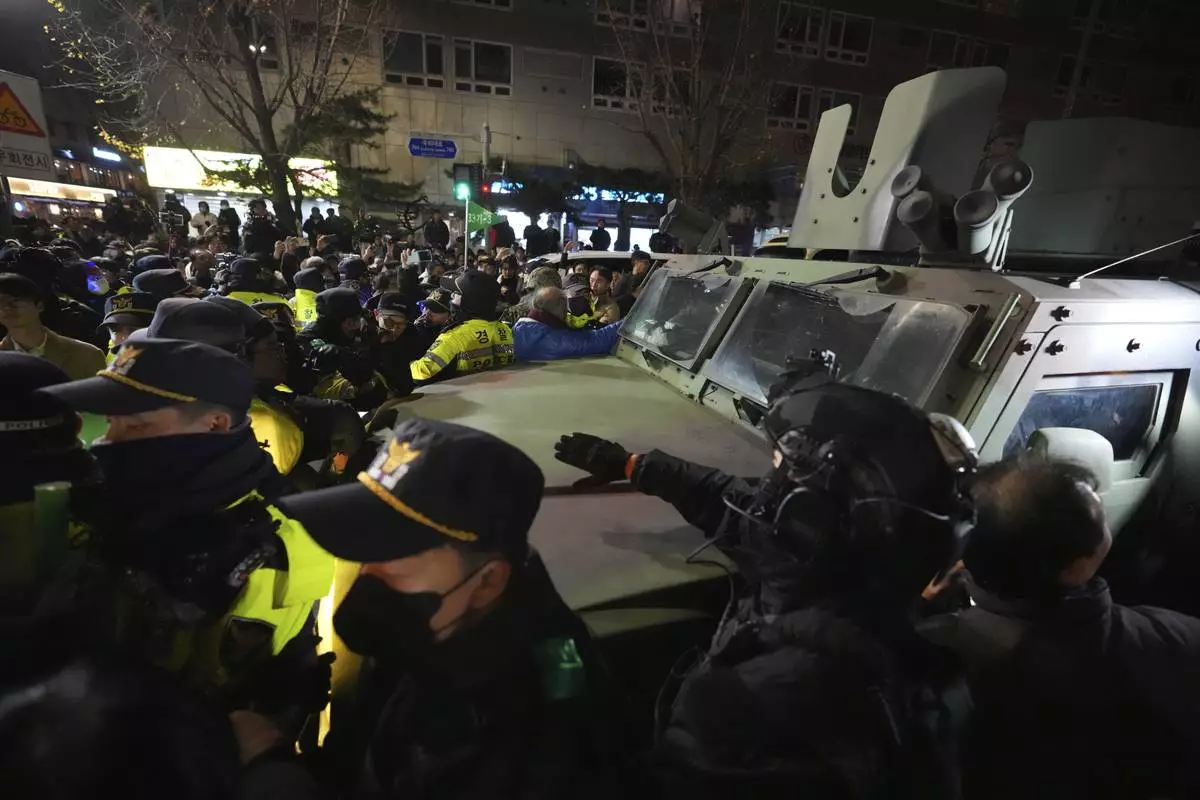
Military vehicle is escorted by police officers as people try to block outside of the National Assembly in Seoul, South Korea, Wednesday, Dec. 4, 2024. (AP Photo/Lee Jin-man)
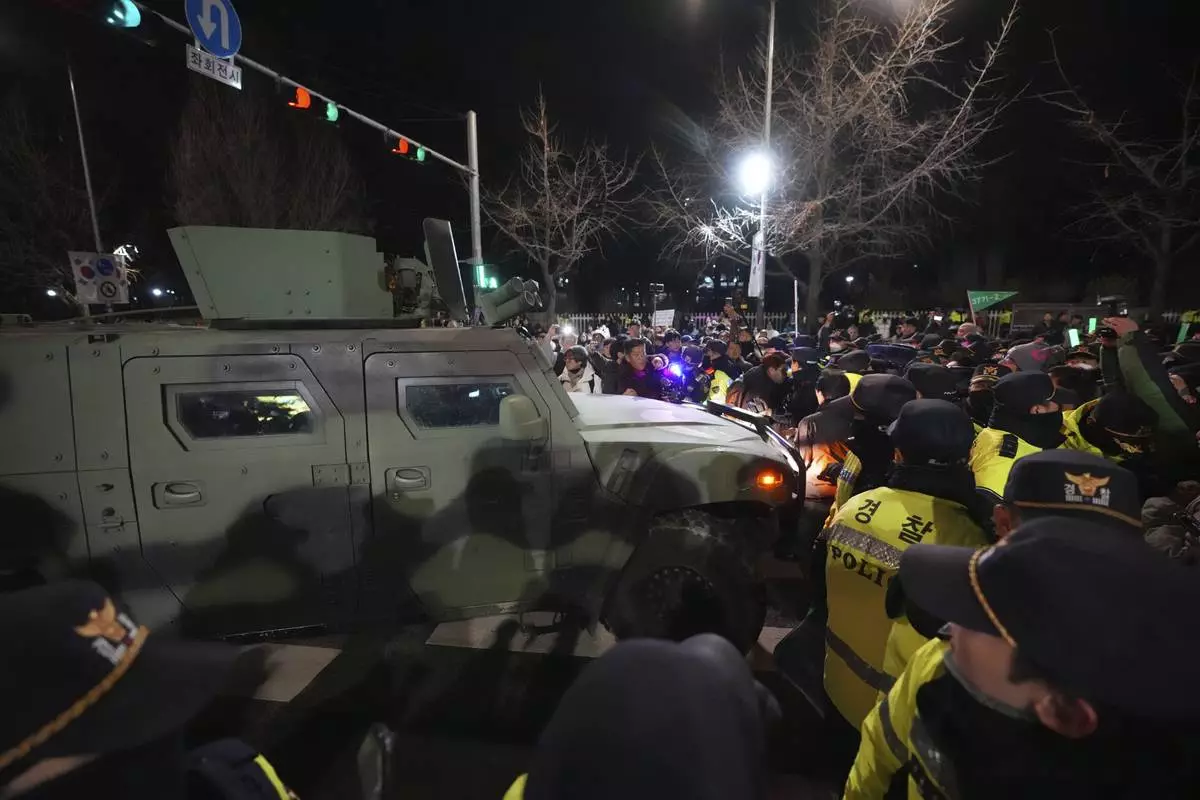
Military vehicle is escorted by police officers as people try to block outside of the National Assembly in Seoul, South Korea, Wednesday, Dec. 4, 2024. (AP Photo/Lee Jin-man)
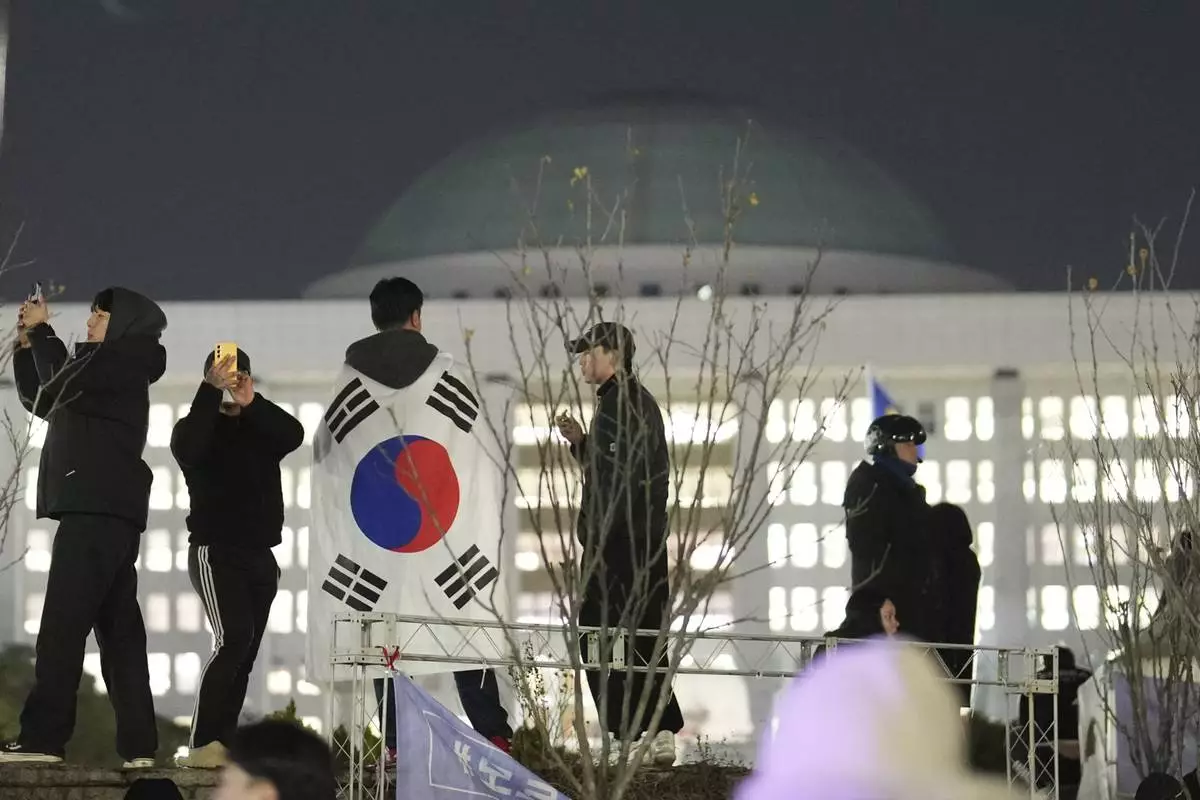
A man wearing a national flag stands on the wall of the National Assembly in Seoul, South Korea, Wednesday, Dec. 4, 2024. (AP Photo/Lee Jin-man)
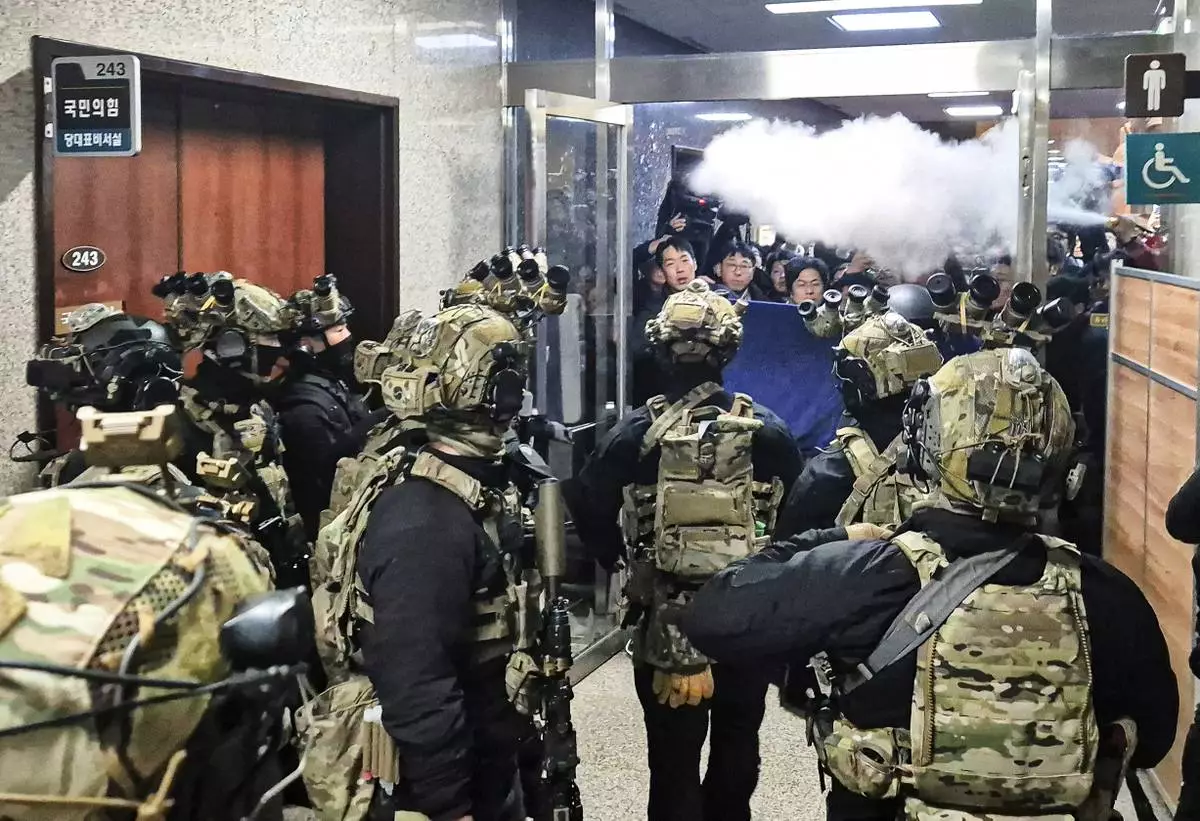
A National Assembly staff sprays fire extinguishers to block soldiers entering the main hall of the National Assembly in Seoul, South Korea, Wednesday, Dec. 4, 2024. (Jo Da-un/Yonhap via AP)
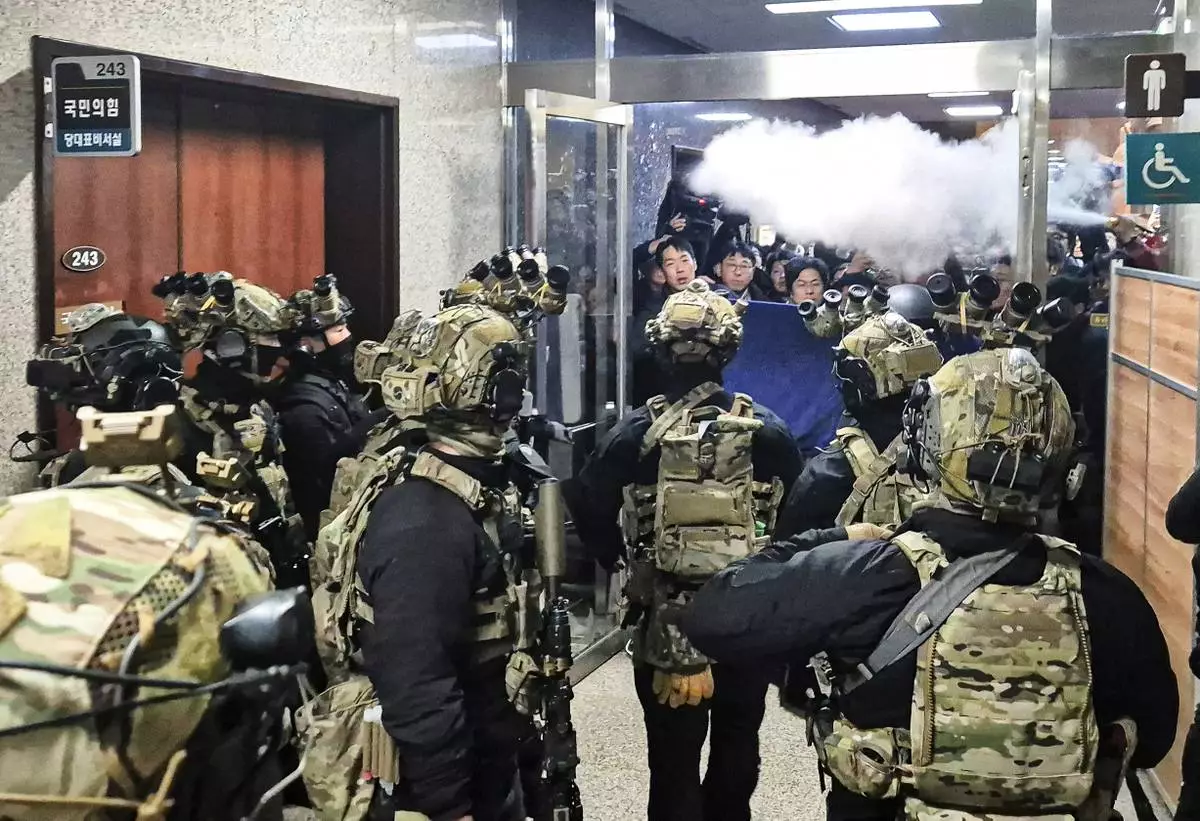
A National Assembly staff sprays fire extinguishers to block soldiers entering the main hall of the National Assembly in Seoul, South Korea, Wednesday, Dec. 4, 2024. (Jo Da-un/Yonhap via AP)
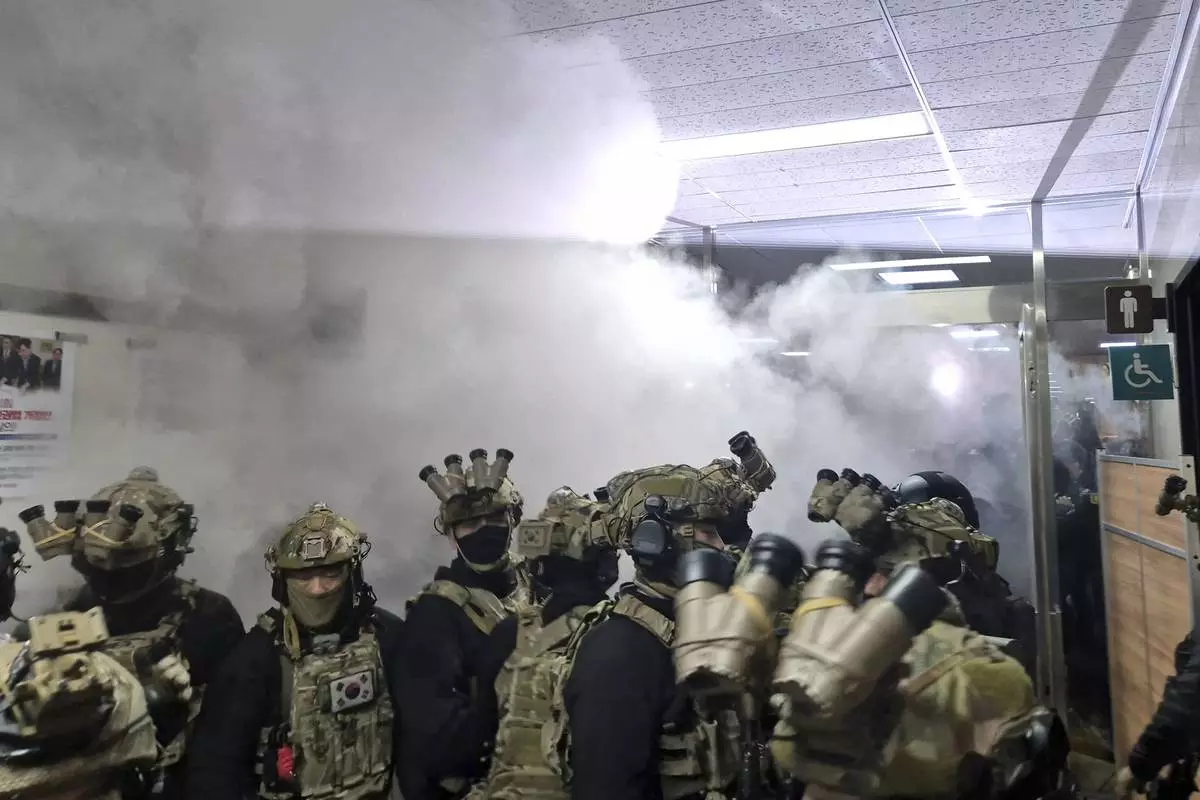
A National Assembly staff sprays fire extinguishers to block soldiers entering the main hall of the National Assembly in Seoul, South Korea, Wednesday, Dec. 4, 2024. (Jo Da-un/Yonhap via AP)
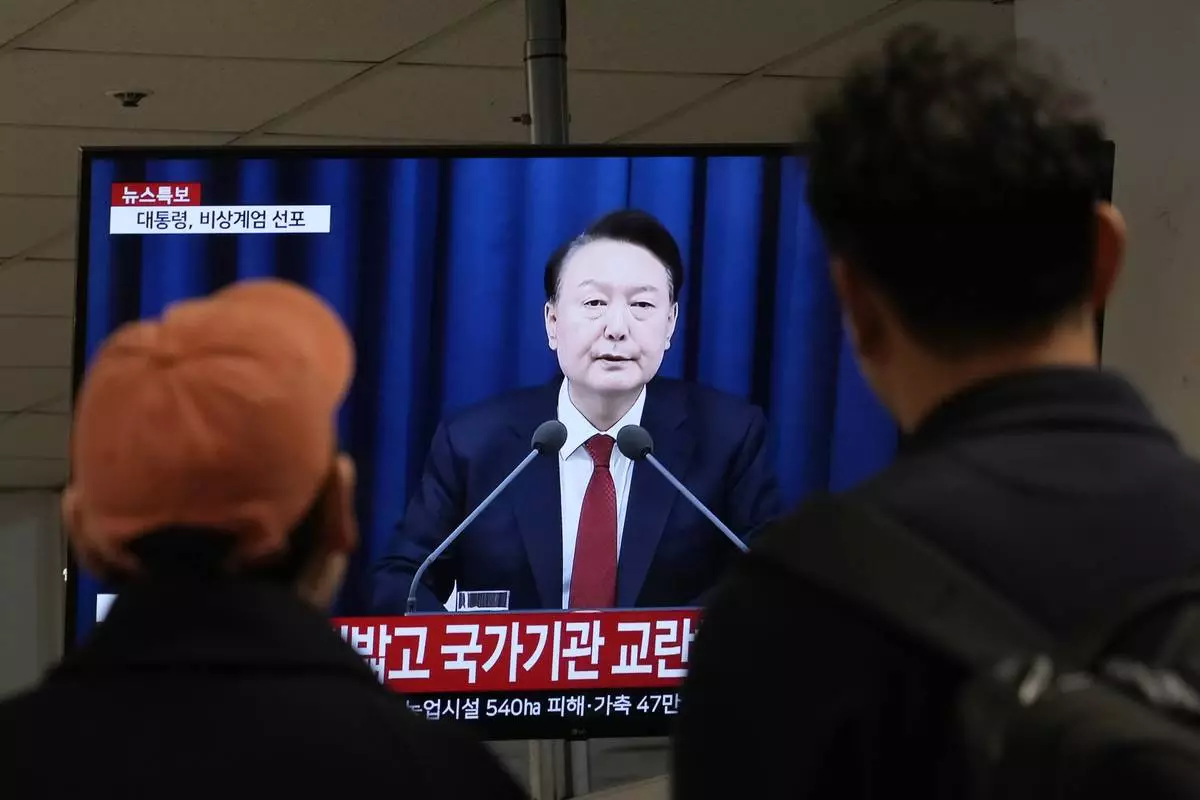
People watch a TV screen showing South Korean President Yoon Suk Yeol's televised briefing at a bus terminal in Seoul, South Korea, Tuesday, Dec. 3, 2024. (AP Photo/Ahn Young-joon)
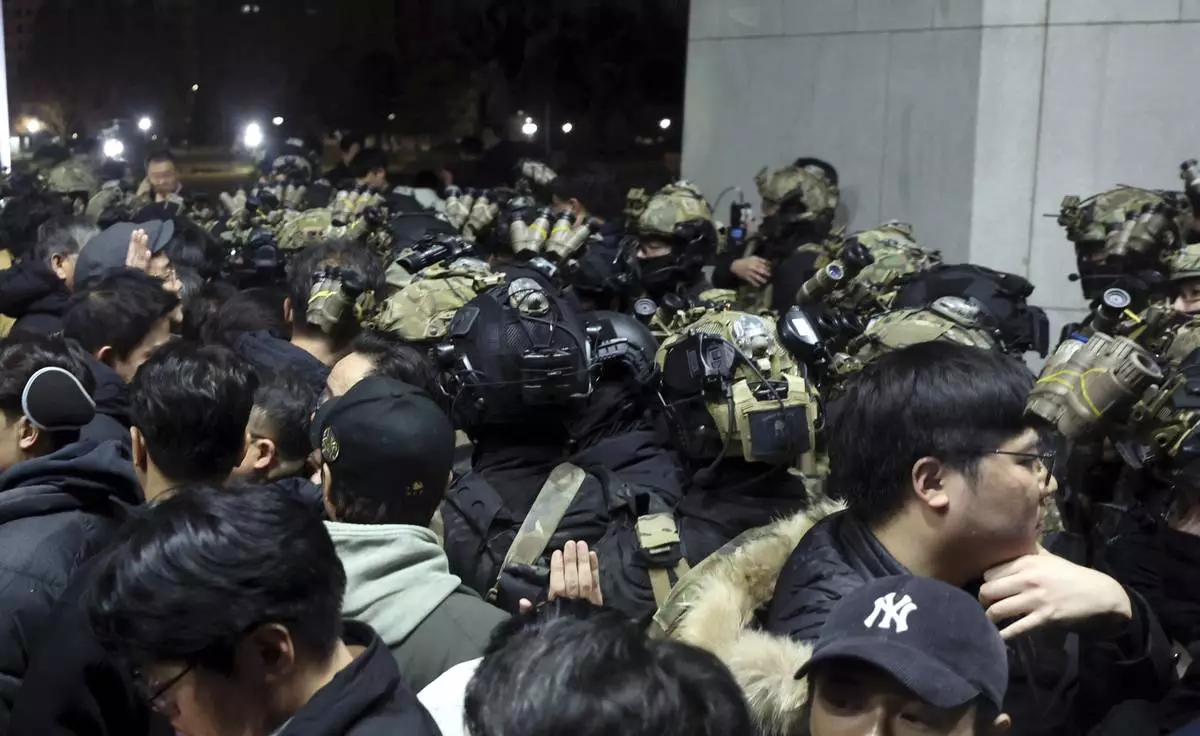
South Korean martial law soldiers try to enter the National Assembly compound in Seoul, South Korea, Wednesday, Dec. 4, 2024. (Cho Sung-bong/Newsis via AP)
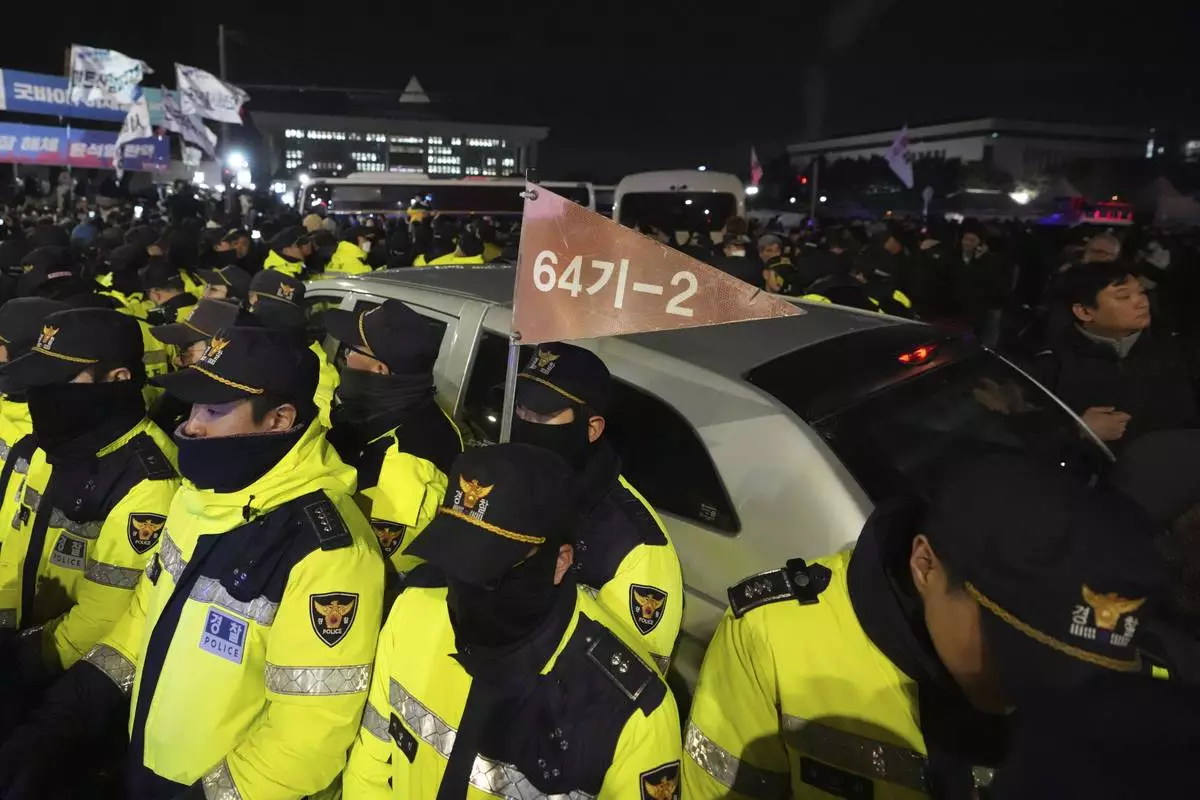
Police officers stand outside the National Assembly in Seoul, South Korea, Wednesday, Dec. 4, 2024. (AP Photo/Lee Jin-man)
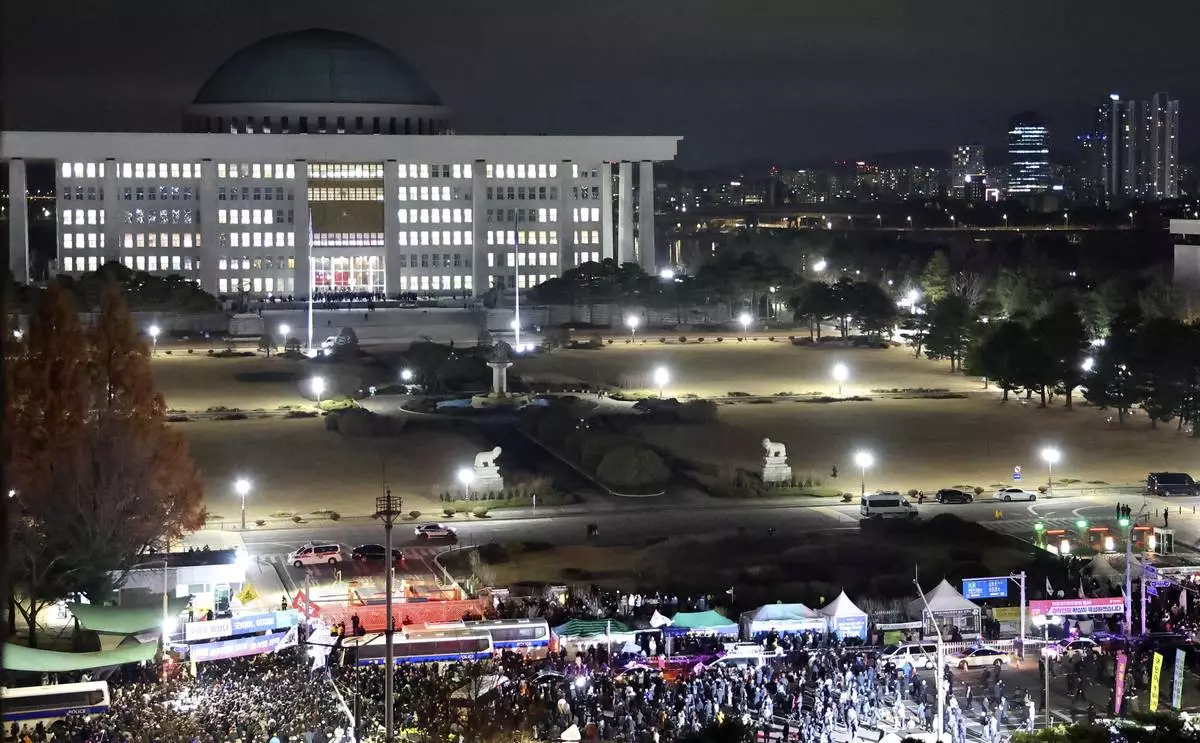
People gather to demand South Korean President Yoon Suk Yeol to step down in front of the National Assembly in Seoul, South Korea, Wednesday, Dec. 4, 2024. (Kim Do-hoon/Yonhap via AP)
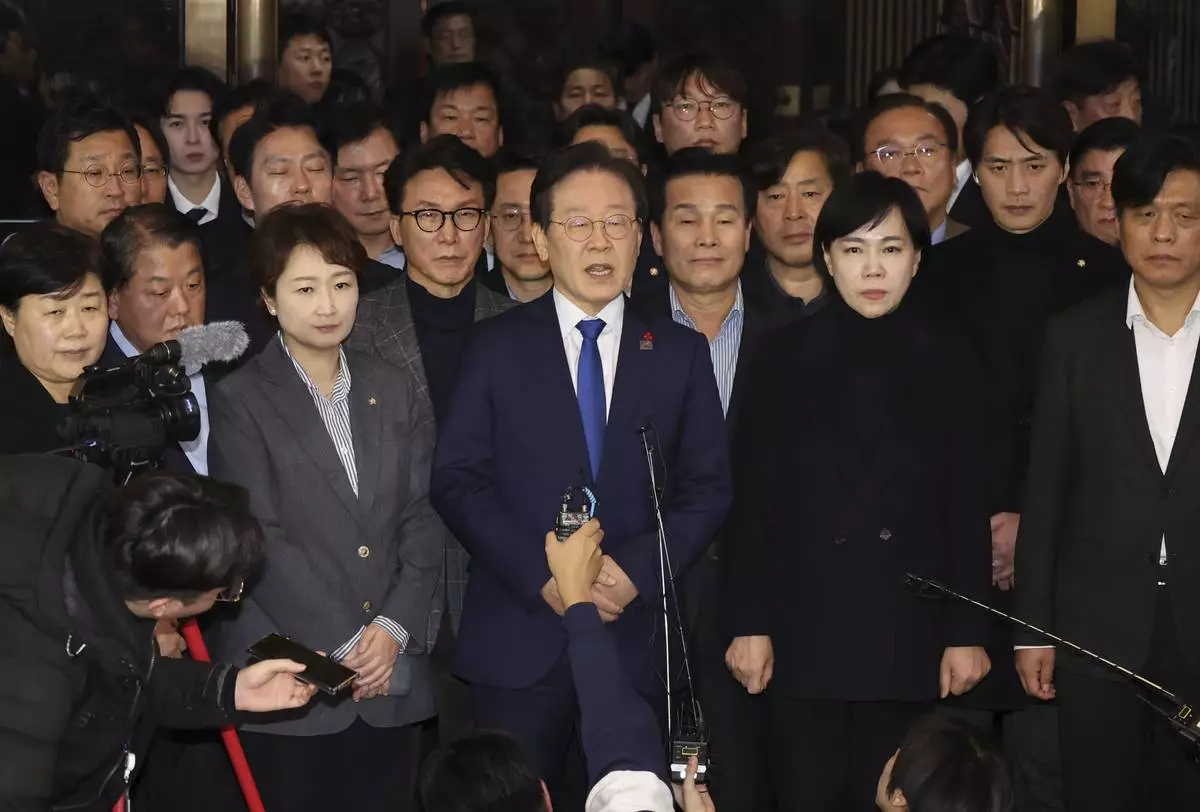
South Korea's main opposition Democratic Party leader Lee Jae-myung, center, speaks at the National Assembly in Seoul, South Korea, Wednesday, Dec. 4, 2024. (Kim Ju-hyung/Yonhap via AP)
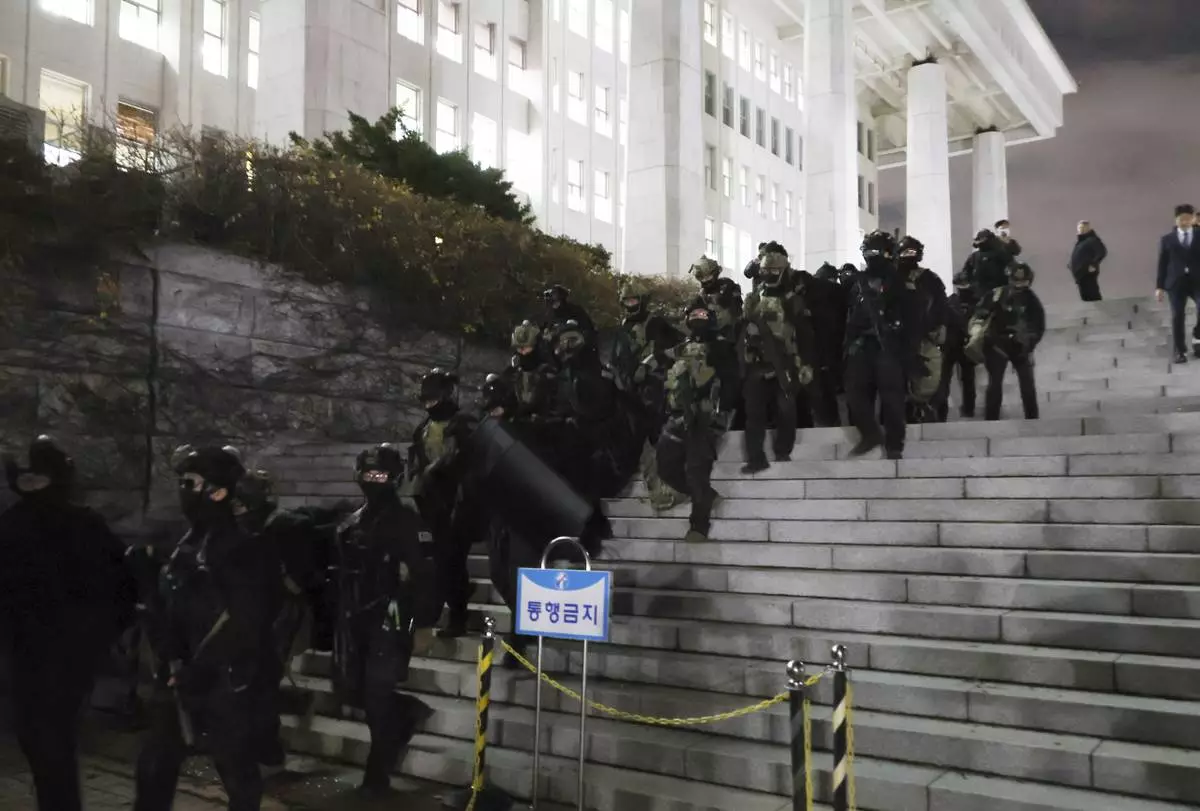
South Korean martial law soldiers leave the National Assembly in Seoul, South Korea, Wednesday, Dec. 4, 2024. (Kim Ju-sung/Yonhap via AP)
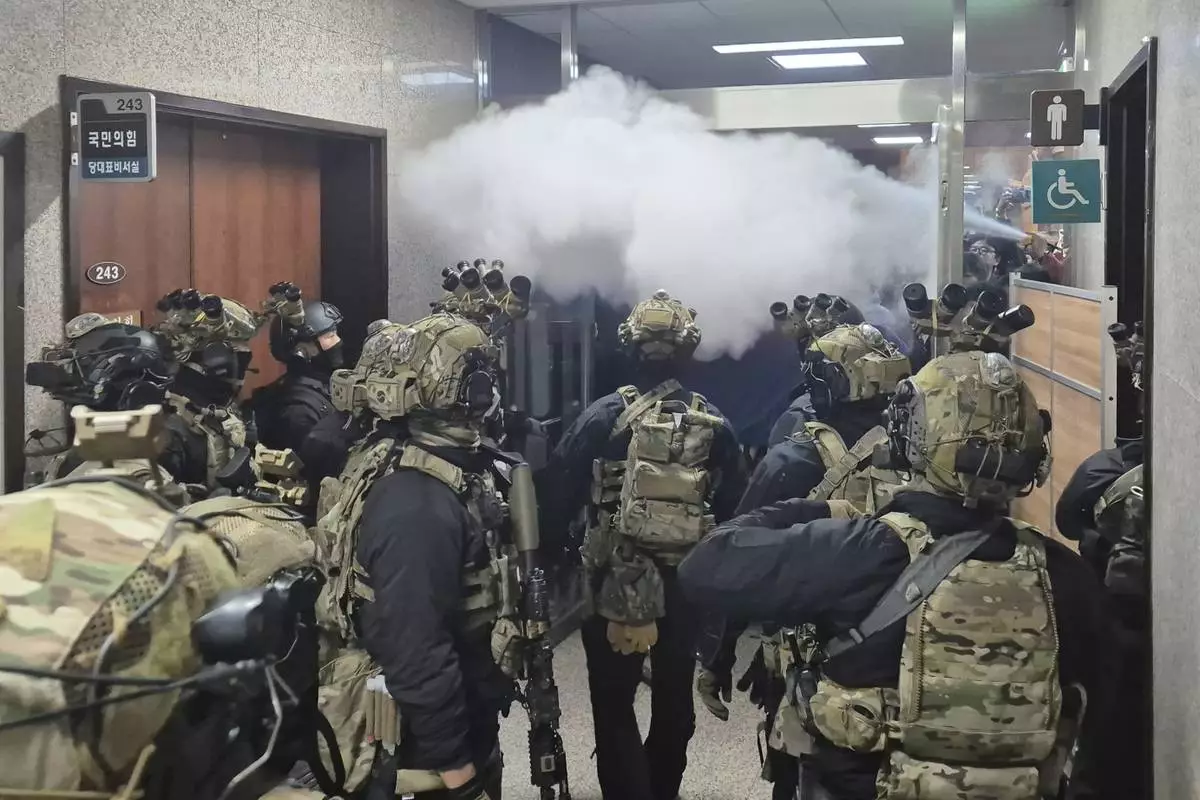
National Assembly employees spray a fire extinguisher towards soldiers at the National Assembly in Seoul, South Korea, Wednesday, Dec. 4, 2024. (Cho Da-un/Yonhap via AP)





